#for example they often turn the positions around claiming they would be the victim
Explore tagged Tumblr posts
Text
The importance of separating belief from practice from economy when criticizing spirituality
I notice that a lot of people who want to criticize harmful expressions of spirituality often conflate the beliefs and practices of those spiritualities together, rather than separating them and asking themselves which one is harmful exactly, and why.
Sometimes, both practice and belief are harmful. For example, going on a highly restrictive detox diet because it will supposedly rid your body of toxins put into regular food by an evil conspiracy. There's no evidence that detox diets actually work as claimed (and if they seem to, it may be that you actually have a food allergy or intolerance, and you feel better because you happen to be cutting out that food for awhile), and they can actually be very harmful. Meanwhile, this sort of conspiratorial worldview has roots in old antisemitic conspiracy theories used to justify violence against Jews in the past, and today, justify queerphobia and ableism by way of suggesting that an evil conspiracy is putting chemicals in our food and water that turn kids gay, transgender, or give them ADHD, autism, or whathveyou.
But other times, it's not quite so simple. For example, let's look at modes of faith healing that hold that you should eschew evidence-based medicine in favor of praying and getting right with God. Meanwhile, studies show that people who rely on faith healing don't exactly have a great recovery rate. Many children have died from treatable diseases because their parents were taught that sickness was a test of faith and God would damn them for seeking conventional medicine. (Can you even imagine how terrified of eternal damnation you'd have to be in order to watch your own child die in agony?)
If we look at most people who believe in prayer, we can see that most of them don't agree with this extreme position. Most people believe in prayer and evidence-based medicine. If anything, prayer gives many people a way to feel like they aren't just sitting around doing nothing while their loved ones are in the hospital, and that itself is arguably beneficial.
Now, if you personally have trauma connected to prayer, or just don't find any meaning or satisfaction in prayer, then it's fine if you don't want to do it. But that doesn't mean it's appropriate to tell everyone else that they shouldn't do it. When you do this, you're just using your own personal feelings as a moral compass, and as we know from observing the "thinking about gay sex grosses me out, therefore it's unnatural and against God's will" crowd, that's no way to go.
So how about beliefs and practices used to extort people? For example, energy healing services often come with steep price tags. But let's be real, so does evidence-based medicine in places like the US. This clearly does not mean people should just stop seeking evidence-based medicine. It does means that we drastically need to change the system, so healthcare is more accessible. Additionally, if there's one thing I've learned from researching alternative medicine, it's that practitioners are more likely to actually offer something for patients' complains, rather than telling them that it's all in their heads or that they need to lose weight. This doesn't mean that an exploitative alternative industry should be allowed to exist, of course. But it does mean that we need to understand how prejudice among doctors fuels it. Moreover, I think we can agree that someone who watches energy healing videos on free YouTube after they've done all they can from an evidence-based medicine standpoint, or offers free energy healing sessions to friends who are in the same boat, are not in the same category as scam victims and scammers.
So yeah, when you're out there criticizing harmful forms of spirituality and religion, remember to separate practice from belief from economy and examine each one separately and in terms of how they connect to each other and to larger issues, rather than putting it all on blast together.
#religion#spirituality#critical thinking#diet mention#child death mention#antisemitism#conspiracy theories#ableism#witchblr#paganblr
27 notes
·
View notes
Text
Round 1


Propaganda Under Cut
Mary Morstan
a controversial one i know, but it’s tumblr. how could i not? anyway shoutout to the writers for CANONICALLY killing her off for the non-canon ship. she was so cool honestly poor girl
Oh god where do I start? Constantly being turned abusive? Killed off (in canon!)? Constantly being removed from fic? I cannot stand the way she's treated, but it's 100% impossible to find Johnlock fic without the "umsympathetic Mary Morstan" angle. It's infuriating!
The fandom insulted Mary at every conceivable turn, refused to acknowledge her narrative importance or impact on the other characters, called for her death repeatedly, and even SENT DEATH THREATS TO HER ACTRESS because she had the AUDACITY to be a morally gray female character who was married to John (they did not care about the moral grayness of the male characters, but she was irredeemable, apparently-presumably because she was a "threat" to the main fandom ship). And though she was definitely sacrificed on a SPECIFIC mlm ship altar, she was still tangentially victimized by OTHER mlm ships too! For example, this fandom was willing to make up a character WHO LITERALLY DID NOT ACTUALLY EXIST to ship with different male character (who was morally...way worse than she ever was), as well as create swathes of content about two men who had maybe one canon interaction in the whole show, before even thinking about the possibility of making content for this character or even just talking about her in a way that wasn't overtly misogynistic and degrading. When Mary died in-story (in what, in my opinion, was an unnecessary, bullshit way), her death was, to this fanbase, not actually about her and was just seen as "proof" that the two male leads would now get together (they didn't). And this STILL continues to this day. People reduce her to "selfish bitch," completely ignoring any of her complexity by claiming that she's incapable of caring about anyone (despite helping to save lives on more than one occasion, as well as dying in an act of sacrifice) and insisting that any of her positive qualities MUST be completely fabricated. I've seen a lot of female characters get mistreated by fandom for a mlm ship's sake, but I don't think I've EVER encountered an example as bad as this one.
Molly Hooper
She's in love with Sherlock, and in fandom she's just considered annoying. Listen, I don't ship them but jesus christ
Honestly I thought her relationship with Sherlock way too abusive (he treated her so badly wth) to turn into a healthy romantic one but the Johnlock shippers were super nasty to the actress -I think she even received dead threats ??? Over playing a fictional character ??? Just because people shipped two dudes ???- and the character deserved better personal development that didn't revolve around her unresolved crush for the main character
Set up as a romantic partner for Sherlock. Often gets shit on for being in the way of Johnlock.
83 notes
·
View notes
Note
okay 🫡
tw: for discussion of SA
mary’s treatment in so many marauders fics is just str8 up dreadful, even in several popular fics. she’s usually objectified which, as much as i love it, was a trend started by ATYD. Like I know why the author did that; they wanted to write a sex-posititive female character and wanted a realistic portrayal of 1970s misogyny. Sirius objectifying Mary isn’t portrayed as a good thing, but it’s not condemned by the narrative either? Mary doesn’t need to go on a whole monologue on Sirius’ mistreatment of her, that would probably come off as pretty corny, but so much of her role is centered on being a support for Remus/Sirius. She doesn’t seem to have many flaws or goals or anything going on internally, which could’ve helped in making her a more well rounded person so we could take Sirius’ words with a grain of salt. And while this isn’t as extreme of a problem as it is in other fic, it did start a trend where Mary is just kind of the “hot popular chick who does all of the emotional labor for two of her male friends but doesn’t seem to care about anything outside of that”. Not saying Mary can’t be hot or popular or sleep around the problem just comes when that’s all she is. And many fics don’t even afford her that so she just turns into a shell for people around her.
the whole ‘Mary being a tool of development for male characters’ is especially disgustung when ppl depict her SA in fics. I don’t think I’ve seen a single depiction of Mary’s assault that was actually focused on her, esp esp in popular fanfics. Mary, the victim, becomes a conduit for the reactions and development of the men around her. Which is just like….fucking insane to me lmao. Sexual assault in general is one of the most traumatic events a person could go through, but since this is also most often written as a hate crime (Mulciber specifically going after Mary bc she’s a muggleborn) that adds an entirely different layer of sickening that ppl just?? Don’t engage with?? Because a victim’s SA should be used in service of development of male blorbos ig. Instead of the actual victim herself.
This also bleeds into my opinion on Mary and oblivation. I actually like the Mary oblivating herself headcanon. I think it’s unhealthy, irrational, morally dubious, extreme, and something someone in her position would do when pushed to the absolute limit. It’s compelling! But apparently ppl are fucking boring bc some ppl hc her being oblivated by dumbledore??? For some fucking reason???? Why would he ever do that???? It literally makes me want to tear out my cuticles seeing ppl rather rip away a woman’s agency than have to be conflicted by a character for five minutes. Let her make bad decision instead of no decision at all!!!
Christ this fandom doesn’t know how to write women
First off, this fandom revolves around men and male relationships, and that is evident in the fact that 70% of this fandom's works are made up of M/M fics. It's been like this for years, and to each their own of course. But when you bring up the undercurrents of misogyny portrayed in fics, people claim that it doesn't exist and they just prefer more gay relationships. That's okay, but don't dismiss the fact that you use female characters as a catalyst for your coming-of-age-esque relationships. ATYD (especially it being one of my first and favourite fics) was a prime example of pushing the dumb-hot-ex-girlfriend agenda through Mary. The author did very bad for never resolving her attachment and detachment to Sirius, or even explaining that being a young girl in a 1970s Scotland boarding school will mess with a woman's mind, and hell, no one else called bullshit so we ran with it.
Oh, don't mention the sexual assault of a black female to the crowd. It's not about her right now. They don't really care. They haven't cared for the past twenty years and the misogynoir is really showing up and showing out! When they cannot give her any other trauma due to the fact that they have provided her no goals and prospects and no real battles and actions, they go ahead to give her one of the worst they could find, then make sure to leave it at that. Can we talk about how fast they resolved the assault? Can we talk about how Sirius and CO. has fucked up the lives of many women but has been brushed under the mat because this is a wolfstar-centric/jegulus-centric story? No?
I've said it before, and I will never stop mentioning it, the microagressions Mary faced with the heavy agressions is what makes me even more pissed at her story. They take her emotional vulnerability (the effect of being a black young muggle in the 70s who portrayed herself as being sexually positive and active, play around it and spit her out) and turn her into a plot device when she's just as valuable as every other male character that is being written. When she was given the chance to have something for herself, do some damage after all the damage was done to her, we gave the blame to Dumbledore? Like I know we blame Dumbledore for everything, but are you going to take away the only thing this woman has done of her own selfishness and make it a man's?
Write those mlm fics if you want, but if you cannot make female characters as dimensional as every other male character, shut the fucking laptop. Give these women motivation. Give them anger and make that anger real and feasible. Make them selfish. Stop embarrassing yourselves!
#sometimes i feel like i miss the point but its 12 am#im working this out#its the fact that this shit doesnt happen to lily and marlene#fucking hell#they give you dumb fucks a blank slate character and you fuck it up massively#some of yall need to stop writing actually#go into the real world and read some news#dont piss me off!!!!#marauders#marauders era#mary mcdonald#mary mcdonald headcanon#mary mcdonald discussion#marauders discourse#marauders discussion#misogynoir
2 notes
·
View notes
Text
Signs of abusive relationship that can be found in the Thor-Films
@alstee We talked about aspects of a narcistic personality disorder we can find in the Thor-films in this thread. The original thread is adjectant to a gif-set, which is why I don’t want to post there. The people who make those gifs are forced to “listen” to the discussion even if they don’t wish to be associated with the anti-Ragnarok party and I don’t want to pull someone into the discussion.
Also, this got kinda long, therefore I put it under the cut. :)
The following text is a quote from you, @alstee, taken from said thread, because I would like to have all relevant points in one thread together.
If anyone is interested, I’ve been skimming through the book The Narcissistic Family: Diagnosis and Treatment by Stephanie Donaldson-Pressman, and it’s super interesting! It’s aimed at therapists, but it’s easy, if sad, to read as a general audience person.
I’ve heard internet anecdotes of people who had to try several therapists before they found one that could actually help them, because the first ones ended up validating/siding with the NPD parent’s perspective (big WHOOPS, continuing that gaslighting) and/or didn’t really get what kind of damage and toxic family dynamics they were actually dealing with.
Now, reading through the book, there are example cases where the patient starts seeking therapy for specific problems, not having the slightest idea that their parents did anything wrong or unusual in their parenting, until a neutral third party correctly identifies the cognitive dysfunction in what the patient is saying, and digs deeper to trace the path of that dysfunctional thinking right to the source.
Also, tell me these two following bits don’t scream MCU Loki:
(This first one explains Loki’s whole behavior in Thor 1 and Thor 2, to a T.)
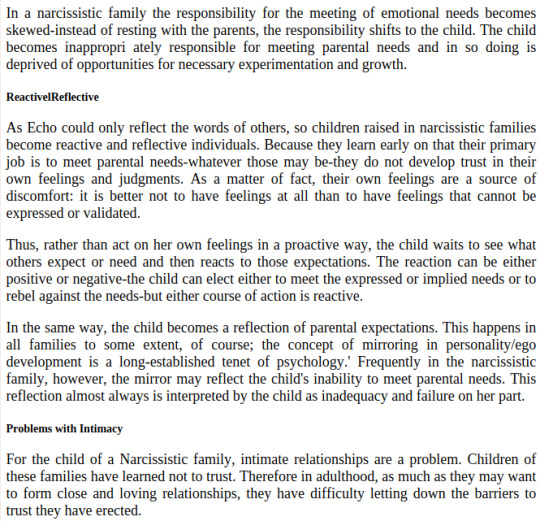
(And this one is in a section about romantic relationships, but I can see this whole thing running through Loki’s subconscious in every scene where he has Thor or Frigga standing in front of him.)
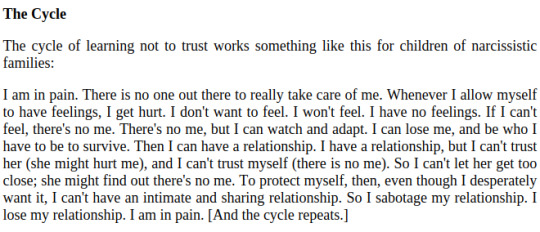
(@lucianalight You have written excellent meta posts about this which opened my eyes in the first place – I had read about this topic years before, but not made the connection to Odin’s family; I hope you don’t mind a tag here?)
<End of quote>
So, I am not completely done reading ‘why does he do that? - inside they mind of angry and controlling men’ by Lundy Bancroft so I raise no claim to completeness. Two short remarks at the beginning: The book describes situations in romantic relationships and is therefore not exactly pointed towards sibling relationships as we see in canon MCU between Loki and Thor. Since I believe abuse to work in many situations similarly, I am still using it to interpret the brothers’ relationship. But this is of course a point that can be discussed.
Second: the book describes situations in which a woman is abused by a man. Therefore, a “he” in the text refers to the abuser and a “she” to the abused. Loki would in this context be labeled “she”, since most signs point towards him being the abused one. The book states very clearly that abuse can happen in same-sex relationships as well and is just as bad and worthy of condemnation as abuse in hetero-relationships. The wording simply eases the reading process because you always know if the author refers to the abuser or the abused.
1. Is Loki really abused?
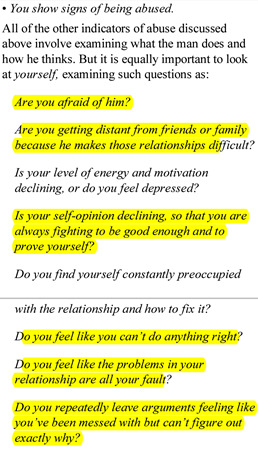
I marked the points yellow which I think might be true in his case. Here some gifs why I think so:
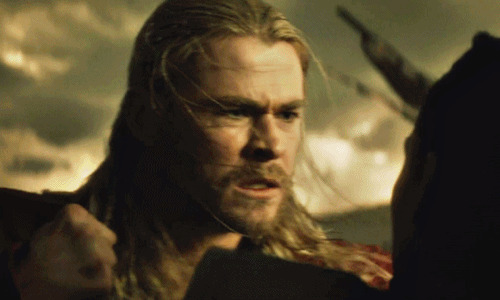
Source of the gif and a nice meta about TDW
The gif is relevant both for “are you afraid of him” and “do you feel like the problems in your relationship are all your fault”.
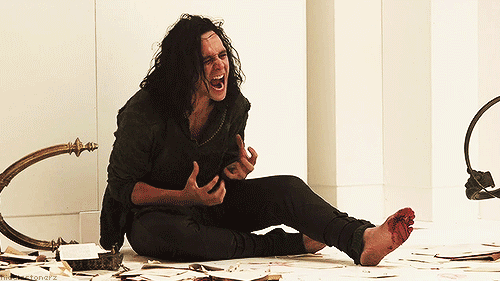
Source
Also, when we see Thor and Loki for the first time in Thor 1, Loki doesn’t appear to have any friends of his own. As to the aspect of isolating him from his family:
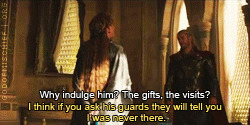
Source
2. Disrespect is the soil in which abuse grows.

I think we know Thor doesn’t respect Loki like he respects other people such as the Avengers and other Aesir.
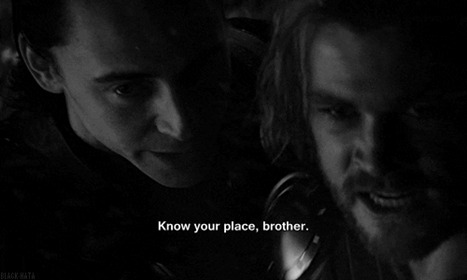
Gif source.
But Thor doesn’t know of Loki’s heritage until the end of Thor 1. So where does this come from?
This whole topic is connected to the first of my introductionary remarks. Abuse in romantic relationships is so common, because there is an imbalance of power in combination with the feeling of being above the other. Due to our social conditioning, the man is mostly more powerful than the woman, and there are far more abused women than abused men. People often argue a woman could abuse a man just as well. The author meets this point that this is true on a surface level, but abuse is mostly based on entitlement. Men, who are raised in a belief of superiority, feel entitled to be catered by their wife and entitled to use force if she refuses or fails to do so.
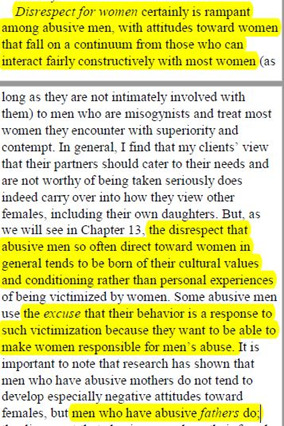
So, we are back at Odin again, who certainly knew about Loki’s heritage and didn’t fail to act upon this knowledge. And not only his dismissive attitude towards Loki carries over to Thor, but also to the staff, as we see in the famous “spilled wine”-scene of Thor 1. So Odin basically taught Thor that he’s better than Loki.

And based on this learned disrespect, Thor feels entitled to enforce the respective behavior in Loki.

Thor shows signs of this power over Loki very early. Loki is the only one of his group he doesn’t ask to accompany him. He just assumes it. And Loki complies. He orders Loki around on Jotunheim, but Loki doesn’t comply this time. We can’t know if Thor would have gotten back to him, because he gets banished before he has the change to. We see Thor quite often demand something from Loki in the following films without Loki obeying. It mostly gets violent after that. But since it still are superhero films we can’t count this as abusive behavior because it’s somehow ‘normal’ in this context. I don’t remember Thor using physical force to make someone else do as he wishes in the films. Interestingly, if he does so it would rather invalidate the theory of him being an abuser, since most abuser make sure only to exhibit this kind of behavior in private, because they don’t want to hurt their public reputation. So if he would threaten people more often, it would rather mean that he’s a brute than an abuser.
Since we already discussed the narcistic personality disorder I would mention that both things can appear in combination:

You might have noticed that I did refrain from using examples from Thor – Ragnarok up to this point. This is intentional. Because most points that indicate Thor would act in an abusive way are relatively rare in the first films (Thor 1, Avengers and The dark world). Thor 1 even sketched out a redemption arc from his arrogance (which is the basis of entitlement) and even though he has his flaws in TDW he isn’t giving in to most of his urges. In the boat scene he threatens to punch Loki, but he doesn’t act on his urge. This is means he does, in fact, NOT feel entitled to do so. He remembers Frigga and recalls he should not. An abuser is different from an angry man because he thinks he has the right to hurt the other one.
This tone changes in Thor - Ragnarok:
I will try to make this as conceive as possible and therefore use a list of methods abusers use in interactions (split into two parts because it was to long for one picture):

Sulking, Refusing to talk: Thor’s behavior in the cell when Loki visits to talk.
Ridicule: He throws stones at Loki in the cell.
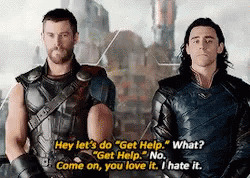
Source
Distorting what happened in an earlier interaction:

Source
(Ok, this one is not sure, since we don’t know what actually happened. But he says first “I dumped her!” and then “It was mutual dumping” which fits the point that past actions get distorted.)
Using a tone of absolute certainty and final authority: In his talk with Hela about her past.

Source
Everything is your fault: Thor demands Loki to lift his magic before Odin’s death. He implies Hela’s return is Loki’s fault. He blames Loki for the situation in the nine realms.
He changes the subject to his grievances: When he talks to Bruce about his fear being on a planet and changes to the point that Bruce has to help him fight Hela.
Part II:
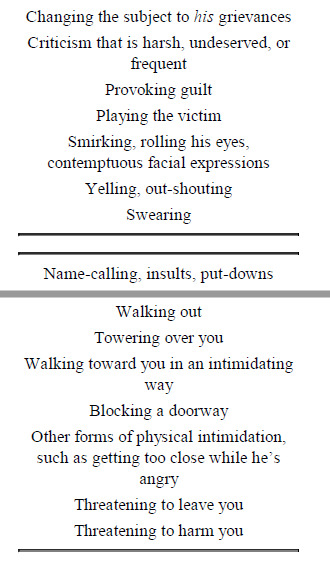
Provoking guilt/Turning your grievances around to use them against you:
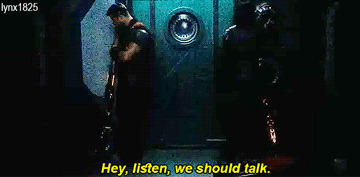
Source
Playing the victim:
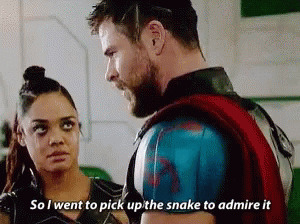
Source
Threatening to leave you:
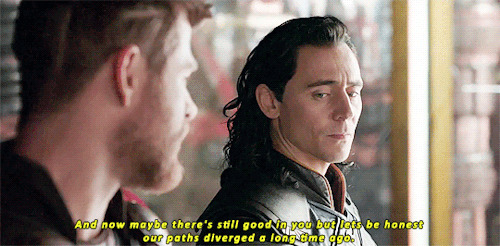
Source
But the major point will always be the physical violence. Here some quotes concerning that:

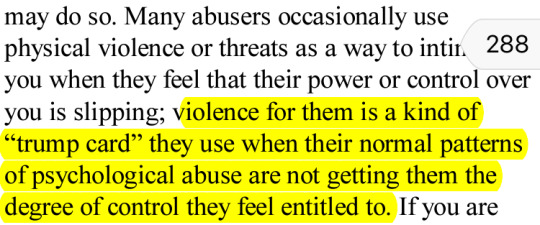



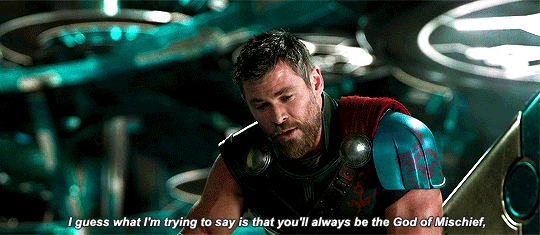
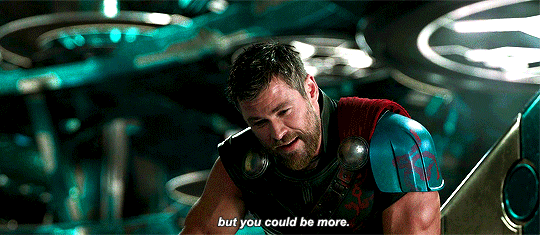
Source
#Anti thor ragnarok#anti chris hemsworth#tw: abuse#mcu salt#anti taika waititi#tw: phyisical violence#mcu loki#tom hiddleston#ragnarok discourse#there is another point i didn't even start on#it is that abusers are very good in turning other people against you#they distort their view on you so they side with the abuser#for example they often turn the positions around claiming they would be the victim#and now we can start talking about Loki's ooc-ness in Thor Ragnarok#and how he suddenly was the bullying kid#But this would be accusing a real person of abuse#and I tried to limit my rambling to the realm of fiction
47 notes
·
View notes
Note
I was wondering, what are the rules about different types of cases lawyers can take, and what types can Matt do? I know he’s a defense attorney officially, but can/does he take on different cases? Could he work as a prosecuting attorney, or in another area (like custody law or criminal prosecution)? What even are the different areas lawyers work in (past just civil/criminal)?
Also, for criminal trials I was wondering if the victim pays anything. Like if a victim is robbed and presses charges, do they have to get a lawyer to prosecute or does the state appoint one? And do they have to pay for this lawyer or does the state pay? (I think for civil everyone pays but criminal is different)
Thank you in advance ☺️
These are great questions!
So lawyers can take on different cases as long as they remain ethical - and as long as they can get hired. ;) The main ethical rules that would apply (as far as I know...my knowledge of the ethical rules is more limited to criminal law nowadays) are the rules that relate to: 1) a conflict of interest; and 2) competence.
The conflict of interest rules mean that a lawyer can't take on a case that is in conflict with a case they already have. So say Matt is functioning as a criminal defense attorney for Client A; he can't simultaneously represent Client A's co-defendant, Client B unless both Client A and Client B waive the conflict of interest because you never know when Client A's defense might clash with Client B's defense.
(A common example is drug possession cases, where A and B are both found in a vehicle with drugs. A might say "The drugs belong to B!" and B might say "The drugs belong to A!" and the same defense attorney can't argue both positions.)
Or say Client A is a criminal defendant charged with battery against Client B, and Client B is suing Client A in civil court over the same incident. Matt could represent Client A in both criminal and civil court, but he couldn't represent Client A in criminal court and then turn around and represent Client B against Client A in civil court.
The other ethical rules at play are those relating to competence. It is unethical for an attorney to take a case that they aren't competent (or couldn't reasonably become competent) to handle. If Matt knew absolutely nothing about, say, wills and trusts, it would be unethical for him to agree to draft someone's will or trust. This also goes to just...time management. If Nelson & Murdock have too many cases, there hits a point where they can't ethically take more cases because they wouldn't have the time to competently handle them.
Not even gonna comment on how this relates to the Frank Castle trial because I'm pretending that trial never happened.
And Matt could never be a prosecutor while working as a criminal defense attorney. He could stop practicing criminal defense and switch over to prosecution, but he can't do both simultaneously. The conflict of interest is just unavoidable, and besides, no prosecutor's office would hire him if he were still doing criminal defense work.
That said, in canon, we see Matt take on many cases, both criminal and civil, simultaneously. Aside from his criminal cases, we also see him handle the following types of civil cases:
Property (as when he represents Elena Cardenas against her landlord);
Employment (and possibly immigration?) (as with Ms. Jacinto in S2E1);
Standard negligence (I think? I think Mr. Marino is being sued for negligently handling his dog by allowing his dog to "defile" the statue in S2E1?); and
Products liability (as with the Aaron James case).
Other areas of law that I imagine he could handle would be family law (divorce, custody, child support, etc.), other negligence claims (like a company that negligently leaves their floors slippery, and someone gets hurt, commonly called a "slip-and-fall" case) (there are literally so many types of negligence claims oh my gosh), and intentional torts (which often have criminal analogs, like assault and battery).
He can do all of these while still handling criminal defense cases, as long as there's no conflict of interest, and as long as he's competent.
As for victims: you're right that it's different between civil and criminal law; in civil law, the (alleged) victim has to pay for their attorney unless the attorney takes the case pro bono.
But in criminal law, it's very important to note that victims don't have attorneys. This is because, although the victim is one victim of the crime (obviously), the other victim of the crime is actually the state.
So for example, if Frank were prosecuted for shooting Grotto...then yeah, Grotto is the victim of Frank's violence, but so is the entire State of New York. That's why criminal cases are labeled "State vs [Defendant]."
Therefore, prosecutors represent the State - they do NOT represent the individual victim. The reason this is so important is because the victim and the State may actually have different interests...or, at least, think they have different interests.
The clearest example of this is domestic violence. Say you have a guy who's been abusing his wife for years, but she, for myriad reasons, doesn't want to leave him. Nor does she want him to be prosecuted. Maybe this is because she loves him, or thinks she loves him. Maybe this is because she's afraid of what will happen to their kids if he's incarcerated. Maybe she relies on him for money, and she needs him to stay out of prison so he can keep providing. There can be so, so many reasons.
However, the State does want this guy prosecuted. The State wants this guy to, at minimum, be put on probation which would require him to get a domestic violence evaluation (which would assess mental health concerns and factors that might exacerbate his behavior) and, based on the evaluation, court-ordered domestic violence counseling. The State may or may not also want a No-Contact order between the guy and his wife, and possibly between the guy and his kids, unless and until he gets better at controlling his violence and/or addressing whatever underlying issues he may have.
A good prosecutor will listen to the victim and hear them out, but the prosecutor does not represent the victim, and the victim does not decide what happens in the criminal case. And so, at the end of the day, the prosecutor is not required to dismiss a case even if that's what the victim wants.
And yes, that is one of the hardest and heartbreaking parts of being a prosecutor.
That said, a victim in a criminal case can also bring a civil case against the defendant. This is important because although a criminal conviction can impose certain penalties (like probation, jail time, and court orders like the aforementioned counseling), criminal convictions can't give the victim any money except for basic restitution.
So for example, if a defendant beats someone up, they'll have to pay for medical bills and things like that. But the defendant won't have to pay for additional damages (like for the pain and suffering experienced by the victim, or for counseling the victim might need to cope with the experience) unless the victim brings a civil case against the defendant. And as I said before, the victim would generally have to pay for that.
Okay I feel like this was kind of a rambly answer...does this make sense?
58 notes
·
View notes
Text
yttd and themes of parental failure; how the adults in our life disappoint us
alternate title: how everyone in your turn to die has mommy issues, daddy issues, or both
I’m not the first person to talk about this, nor will I be the last, but there are a lot of themes sprinkled throughout YTTD’s story and one of the themes that isn’t talked about much is the theme of how parents (or more broadly, adults) tend to fail us. Throughout the game, we see children and adults being placed in the same deadly situation, and are disappointed time and time again as the adults prioritize their lives over those of their children... often perpetuating the cycles of abuse that they themselves have suffered. I don’t think this theme encompasses the whole story by any means, but I do think that, in some parts, YTTD attempts to tell a story of irresponsible adult figures, failing as parents, and the ways cycles of abuse are perpetuated.
I think it’s best to start with Sara, the main character and the most visible victim of the adults’ failings in the death game. Despite being a teenager, she’s elevated to a position of leadership partially by circumstance and partially by the machinations of others. I think it’s pretty clear that her being a leader is more crucial to the story than it initially seems to be, but for now it’s evident that she, as a child, has been deemed stronger than the many adults beside her in the game and has thus been made a leader. It’s acknowledged that she is the person who makes the majority of the crucial decisions, she is the person the others look to in times of turmoil, and she’s tasked with shouldering many of the heavy burdens of the group’s failures. This certainly doesn’t come without consequences; much of Sara’s grief comes not just from Joe’s death, but from regret over the countless people she’s failed to protect and the obligation she feels to prioritize their lives over her own. While many of the adult characters (Q-taro, Keiji, Shin, Alice) have the opportunity to sit back and make more selfish decisions for their own survival, Sara never has that liberty because she’s been thrust into a role where the group’s wellbeing is worth more than hers and every group failure is felt by her more than anyone else. This is most evident in the aftermath of the Kanna/Shin decision, specifically in the Kanna Dies route; Sara is the one who is tortured and meant to feel the most pain for Kanna’s death because she, as the leader, felt obligated to take the decision into her own hands... and nobody stopped her. From Russian Roulette (where Kai, the least underhanded out of all of Sara’s adult protectors, tried to stop her from becoming a leader) to Chapter 2′s Main Game, the effects of Sara’s leadership are heavy. She’s still a child who’s been given power, and the other adults in the game choose to either profit from or resent this power instead of challenging the fact that a child has been entrusted with it.
This is where Kanna comes in, another child who’s been failed by the adults in the game. When she entered, she’d lost her most important mentor figure (her sister) and as a result was left incredibly vulnerable. At first, a few of the characters tried to help her (Nao and Reko), but ultimately she was left vulnerable for too long and Shin used that vulnerability to coerce her into going along with his plans, putting her life in jeopardy by claiming she had the Sage. It’s likely that Shin reminded her of Kugie, which motivated her to stick by his side, but there’s no doubt that his manipulation influenced her to continue supporting him throughout chapter 2. Kanna is another character who felt obligated to provide protection and support for adults who didn’t provide all that much of it, which is made evident as she continues to insist he’s a good person throughout ch2 and, of course, demands that everyone vote for her to die in the main game because she thinks Shin is not only good but much more useful than she is. She, like Sara, continues to prioritize the well-being of the group over her own as a result of the position she was forced into and of the failure of the adults around her to do anything about it.
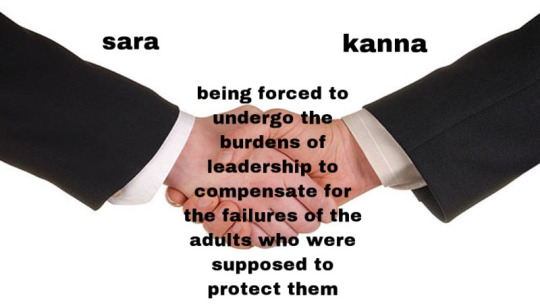
This aspect of Kanna’s character ties into another point I want to make, about cycles of abuse and protection. I believe that Shin is one of the biggest in-game examples of how abuse victims can be pushed to perpetuate those cycles upon the people they’re supposed to love and care for. Shin definitely cared for Kanna; he wrote the message in the phone to boost her spirits and fought for her to survive even knowing that if she got the Sacrifice she wouldn’t pick him to escape with. However, a lot of his dynamic with her comes as a result of the abuse he suffered under Sou Hiyori, and this abuse is part of why Kanna perceives herself to be worthless. He takes out his own anger at himself and his weakness by constantly belittling Kanna, calling her weak and useless to the group (eventually doing this because he thinks it will help her escape), and the constant reinforcement of this mindset is what leads to her self loathing and, in some cases, eventual self sacrifice. Not only does Shin fail to protect Kanna from death as a parental figure, he fails to prevent his own patterns of abuse from affecting her. This is a classic example of how abuse can become generational.
I want to cycle back to the topic of Sara, now, and bring Keiji into the mix, because I believe that Keiji is one of the biggest and also most fascinating examples of the failures of adults- primarily because he is simultaneously the child being failed and the adult who is failing. Keiji started out as an idealistic child with high hopes for his own future and strong beliefs in the police force, but he ended up killing his mentor and destroying his own faith in the goodness of the police. I also find it intriguing that the person he kills is one of the most solid parental figures in the game; Mr. Policeman cares for his child a lot and shows great care for children who aren’t even biologically related to him (such as Keiji). He likely left the police force for the sake of his child as well as to escape corruption. When Keiji kills him, he is not only killing the idealistic dream that his child self once harbored, but he is killing the biggest human embodiment of that dream in his life. Fittingly, then, Keiji goes on to turn into the opposite of what his younger self would have wanted to be. He wanted to be a protector, but in the Death Game we see him flirting with the child he’s protecting, consistently lying to and deceiving her for his own gain, pushing her into being a leader because it benefits him, and going behind her back to help himself survive (such as performing the card trade with Q-taro when it’s clear that Sara had the Sacrifice and likely would have died because of it). At the surface, Keiji is a betrayal of the mentor Sara needed in her life, but when you look beyond that, he’s a betrayal of the adult figure who guided him and the adult figure his child self wanted to be.
There’s also Q-taro, one of the more blatant examples of an adult who valued his own survival over those of the children in the game. His selfishness, however, wasn’t concealed with concern for the children, like Shin’s and Keiji’s were. He indirectly participated in thrusting Sara into a leadership position, and time and time again attempted to get the children (specifically Gin) killed because he thought it would benefit either him or the group. His selfishness is not as much of a betrayal as it is a sad reinforcement of the idea that adults in this game can’t be trusted to protect the children. Even as he campaigns for Gin and Kanna’s deaths, even as he waits until the last minute to press the button, he still looks to Sara for guidance and trusts her as a leader. To make things even worse, the child whom he’s targeting has already been disillusioned to how pathetic adults can be; Gin’s father abuses alcohol, and as Gin establishes from the beginning, he’s already lost his trust in the reliability of adults. And, in a sad way, Gin ends up being proven right; his first father figure in the game dies immediately, and his second either dies or is quickly revealed to have been tasked with killing him. Unreliable adults in awful circumstances.
Then you have Gashu, one of the only actual parents in this game, whose failures are felt in not one, but two children. As I stated before, while talking about Sara, Kai was one of the only people who made a move to stop Sara from being established as the group’s leader in Russian Roulette. While I believe that this is mostly because he knew of the Hades Incident and wanted to stop it from being replicated, I also have to wonder if it was because he knew what it was like, as a child, to be forced into a terrible position (as Gashu had high expectations of him as an assassin) and didn’t want the child he’d grown affectionate towards to be forced to undergo the same thing. Whatever his motives were, Kai was an example of the pain neglectful parents can bring, and he provides a stark contrast to Ranger, who wasn’t yet aware of Gashu’s cruelty when we met him. We watched in real time as Ranger realized that he wasn’t actually all that loved or valued; he was just created to serve a purpose, and when he stepped out of line he quickly lost his value. Just like how Kai served the purpose of being an assassin, and, potentially, how Sara serves the purpose of being the leader. Gashu isn’t just a neglectful parent, he’s outright malicious.
I’d like to speculate, then, about how the story is going to take the path of neglectful adults as it goes forward. I already think that we can see where it’s going to go with Sara, as 3-1a has clearly showcased the effects of her guilt and, depending on which route you take, has either established that she’s grown comfortable with her position as leader or is crumbling under the pressure of her grief. However, going back to the theme of parents... it must be noted that almost none of the characters have been confirmed to have 2 biological parents. They either come from an orphanage or are missing a parent... and the parent they’re missing is typically the father. I have to wonder if this consistent theme of failed parenting is going to tie into Gashu’s reminder to “question your upbringing,” and if the shitty adults are going to make a more literal appearance.
#holy FUCK this was long#if you read this entire thing idk whether to thank you or apologize#also this was so poorly written im so sorry lol#yttd meta#your turn to die#yttd#kimi ga shine#sara chidouin#shin tsukimi#kanna kizuchi#keiji shinogi#depressobean rambles#my writing
333 notes
·
View notes
Note
Hi there - we’ve been following you for a while now and really appreciate how you handle discourse and take part in civil discussion surrounding endosystems and tulpa systems. A couple of our alters want to unfollow because of something we saw on a couple other blogs, but I wanted to reach out to ask you directly about this before we unfollowed, because I and some other alters look up to you and like your blog.
The issue in particular is we’ve heard from multiple folks that you’ve advocated for not using violence against Nazis in the past. Mind, we haven’t seen any receipts or screenshots that back up this claim, but we’ve seen it made by multiple people.
This is a huge issue for us as a Jewish system! We can’t continue to follow you in good faith if this is true. We’re wondering if you can clarify this at all?
Thank you so much!!
-🫧🍓
This issue is a complicated one, but to put it simply, I am against neutral or counterproductive violence. Neutral violence would be violence that doesn't accomplish anything positive. Counterproductive violence is violence that would hamper efforts to achieve your positive goals.
I do not support violence on the basis of "this person deserves to be hurt." I do support goal-oriented violence that aims to reduce harm being carried out to others.
The American prison system and the politics around it are an example of the dangers of revenge-driven morality. Prisoners are kept in horrible conditions. Sentences are increased, but there is little attempt at rehabilitation. The justification is that these are bad people and deserve to be hurt. The result is that once they're released, they're more likely to commit crimes and therefore be put back into prison.
A more humane prison system that focused on rehabilitation would ultimately be more beneficial to society. Thus, the current prison system is a form counter-productive harm that's driven by revenge-thinking. It's not about the greater good, but about the gratification of hurting people who are deemed to deserve it.
To expand on my position:
Harming people is morally wrong.
If you allow other people to be harmed when you could prevent it, then you're responsible for that harm as well.
When these ideals conflict and someone would perpetrate harm to others, it may be required to cause harm to the perpetrator to prevent them from harming another.
At this point, violent and nonviolent options should be weighed towards the most productive to accomplishing your moral goals of preventing harm to the innocent. The most likely to lead to a positive outcome should be chosen.
I do believe that many cases of political violence are counterproductive. Often, fascists will use violence against them to justify their fascism and increase public support for their regime. Nonviolent revolutions that turn violent will typically see public opinion turn against them, and the public becomes more willing to support fascism. Fascists have even been known to fake acts of violence through false flag attacks because being seen as a victim helps garner sympathy.
I also believe that more often than not, a pen can be more effective than a gun in resistance movements. Someone who dies shooting a fascist dies eliminating one fascist from the world. Someone who is executed for disseminating propaganda that manages to convert a hundred fascists died eliminating a hundred fascists from the world. The goals of any movement for change need to be to increase active support past a certain threshold before change can be enacted.
In most situations, I personally believe non-violent methods are usually much more effective at resulting in a higher net good than violent methods.
But here is the bit of nuance that I think got lost along the way... in the situations where the calculus has been conducted, both violent and nonviolent options are considered as methods of preventing significant harm, and violence is deemed to be the most effective method towards accomplishing these positive moral goals, violence becomes a moral imperative.
Essentially, the choice to use violent opposition has to be oriented around doing what's right for those you act in service of and mitigated with critical thinking to determine if it's the best course of action available. If you have to inflict violence, then it needs to be in service of a specific goal. Violence itself or the emotional gratification from committing violence should not be the goal.
9 notes
·
View notes
Text
How the IMF loan-sharks the global south
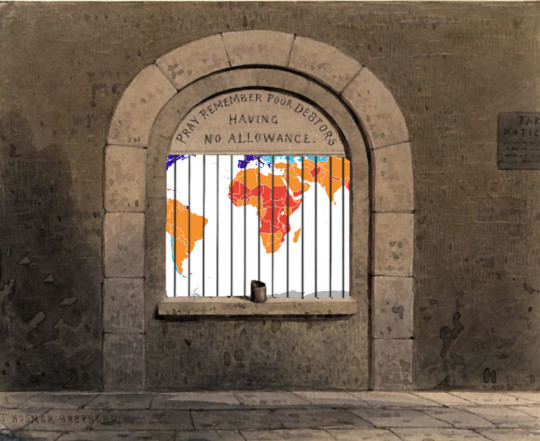
When you take out a loan or get a credit card, the headline figure is the “APR” — the annual percentage rate of interest. But anyone who’s ever borrowed because they were poor and needed money has learned the hard way that APRs are pure fiction.
To get the true APR (what economists politely call the “effective” APR) you have to factor in the fees, penalties and other gotchas that turn reasonable seeming interest rates into perennial, inescapable debt-traps.
Take student debt. During the 2020 presidential campaign, we had a debate about student debt forgiveness, whose opponents frequently cited the “unfairness” of allowing people to “escape their responsibilities.”
https://pluralistic.net/2020/12/04/kawaski-trawick/#strike-debt
In their telling, student debt forgiveness would reward fecklessness, allowing people who got the benefit of an expensive education to duck the costs.
Now, even if you ignore the farcical inflation in university tuition and expenses (for example, the 1000%+ hike in textbooks driven by ed-tech monopolists), that’s still a highly selective account of how student debt works.
Student debt is negotiated from a position of weakness and naiveté, which allows lenders to attack the poorest grads with incredible fees and penalties. “Chris” took out $79k in student loans in 1982. He’s paid back $190k. He still owes $236k.
https://taibbi.substack.com/p/student-loan-horror-stories-borrowed
That’s not the magic of compound interest. It’s the magic of loan-sharking. If you’ve ever used a payday lender (aka a “fintech startup” AKA a “loan shark”), none of this will be the least bit surprising. This form of usury is as old as Christ casting out the money-changers.

The payday lending industry didn’t invent these tactics, but they refined, automated and industrialized them, then they spent millions at Trump hotels and (in a stunning coincidence) all those tactics were blessed by the US finance regulators.
https://www.propublica.org/article/trump-inc-podcast-payday-lenders-spent-1-million-at-a-trump-resort-and-cashed-in
The normalization of loan-sharking sent the entire finance sector into a race to the bottom. America’s largest banks saw their profits soar during the pandemic due to record overdraft and other fees — in other words, collecting fines for being poor.
https://pluralistic.net/2021/04/22/ihor-kolomoisky/#usurers
The sums are jaw-dropping. In 2020, Jpmorganchase made $1.5b on overdraft fees, Bank of America made $1.1b and Wells Fargo made $1.3b. The biggest rake came from the worst months of the pandemic.
https://prospect.org/economy/big-banks-charged-billions-in-overdraft-fees-during-pandemic/
78.3% of all overdraft fees come from just 9.2% of bank customers. At $35 a pop, these fees turn the banks’ overdraft facilities into loans with an “effective APR” of 3,500%.
Three thousand.
Five hundred.
Percent.
These are the cold, bloodless numbers of the debt trap. They conceal a vicious cycle in which those with the least pay the most, a cycled that can’t even be outrun in death.
https://pluralistic.net/2021/05/19/zombie-debt/#damnation
Take a moment to (re)read Molly McGhee’s Paris Review essay from May 2021, “America’s Dead Souls,” about her mother’s death. McGhee’s mom made less than $10k/year and suffered ���debilitating depression while caring for aging parents.”
https://www.theparisreview.org/blog/2021/05/17/americas-dead-souls/
Her mother was haunted by two warring clans of ghouls: debt collectors who harassed her through legal and illegal means, and con artists who located her through databases of struggling debtors and tried to sell her predatory consolidation loans.
48 hours after her mother’s death, these blood-suckers switched to harassing McGhee, as she grieved her loss. Unlike her mother, McGhee had the resiliency and wherewithal (a credit card) to hire a lawyer, whose boilerplate letter reduced the debt by 90%, over $250k, poof.
If you can afford a lawyer, your parents’ debts don’t become yours. If you can’t, you enter a cycle of intergenerational poverty, with each generation sinking deeper into debt.
When you have nothing and owe everything, debt collectors know that they have to terrorize you into putting their bills ahead of the others. The cruelty is literally the point — without it, you might pay your rent ahead of your mother’s old credit-card bills.
To quote Umair Haque, “America is the the world’s first poor rich country.” an “advanced economy” where a sizable portion of the population lives in conditions typical of the global south.
https://eand.co/the-worlds-first-poor-rich-country-c411afc68539
Not for nothing. The same tactics that impoverish the vast American underclass also work to keep the world’s poorest countries — rich in resources and talent — poor. The loan shark here is far more powerful than a payday lender or even JP Morgan — it’s the IMF.
A new report from the Center for Economic and Policy Research dissects the way the IMF uses fees and penalties to trap the poorest countries in the world in unbreakable cycles of debt — fees that drive up the IMF’s notional APR to dizzying, usurious heights.
https://cepr.net/wp-content/uploads/2021/09/IMF-Surcharge-Report-2.pdf
Like any predatory loan, these “surcharges” are levied against the countries that have the least ability to repay. They target countries whose debt:GDP ratio passes an arbitrary line. For the poorest IMF debtors, surcharges account for 45% of all non-principle repayment.
These numbers add up. In Egypt, surcharges gobbled up $1.8b between 2019–24 — triple the cost of fully vaccinating the whole country. Small wonder that the world’s 64 poorest countries spend more on external debt payment than they do on their own health care.
In its defense, the IMF offers the same tissue-thin responses that any arm-breaker offers. The claim that penalties and fees are a way to “incentivize” debtor nations not to overborrow, and to seek their credit from the private finance sector.
But these countries are borrowing to pay off their debts — often debts that date back to colonial times, in which the rich (white) world mercilessly looted their resources and fomented destabilizing political divisions.
This undermined domestic resistance to imperialism and allowed kleptocratic, corrupt leaders to thrive — leaders who borrowed heavily to finance vanity projects, corrupt enrichment of domestic elites, and militarized suppression of opposition movements.
All of that was funded by debts, often from the IMF, who tied lending to the dismantling and sell-off of state enterprises, from power to water to sanitation — which is how the world’s poorest get gouged by the world’s richest to drink their own water.
These countries don’t borrow because they want to live outside their means — they borrow because they want to live. They don’t borrow from the IMF because they’re too lazy to ask a multinational bank for credit — they borrow because they can’t get credit elsewhere.
But the IMF has another excuse for this: they claim that the fees they extract allow them to originate more loans, creating a virtuous cycle. But as the report makes clear, this is absurd on its face.
The IMF went into the pandemic boasting about $1 trillion in “firepower” (that’s creepy-cutesey IMFspeak for “cash reserves”). Meanwhile, the annual revenues from these fees is $1b — that’s three orders of magnitude less than that “firepower.”
That means that the IMF could simply give up on these punitive fees, levied against the poorest people in the world, at an annual cost of 0.01% of its reserves. Literally, the cruelty is the point.
The point of all of this? The victims of usury are all in the same boat — in the USA and around the world. The same tactics, the same excuses, the same misery, from Cairo to the Caribbean to Cleveland.
Not all debt is created equal, of course. If you’re Elon Musk or Peter Thiel, you can get sweetheart loans and roll overs that let you avoid almost all taxation through the fiction that you earn no income, even as you amass hundreds of billions.
https://pluralistic.net/2021/06/08/leona-helmsley-was-a-pioneer/#eat-the-rich
And of course, if you’re a government with debts denominated in the currency you issue, it’s not really “debt” at all — the only way the US government can run out of dollars is by ordering its employees not to type more dollars into existence in a central bank spreadsheet.
Indeed, you couldn’t ask for a starker example of the difference between monetarily sovereign nations and postcolonial countries that owe debts in the currencies of their former conquerors. Venezuela can’t spend its way out of US dollar debt by creating bolivars.
Like McGhee’s mother, whose debts turned out to be fictions that disappeared as soon as a professional with credentials and access to the levers of power printed out a boilerplate letter, these countries’ debts are cruel fictions.
The powerful and wealthy can indulge these fictions or ignore them, as they choose. For example, finance-friendly politicians can insist that the “debt ceiling” must not be raised, for political purposes.
When the US declines to do the trivial data-entry that would make the money to pay its sovereign “debts,” the consumption that the money would have funded still takes place — financed not by the democratic state, but rather by a loan-shark.
National financial “prudence” interrupts the normal and benign process of sovereign money-creation, opening space for usury — private borrowing from the vampires and ghouls whose 3,500% APRs are redeemed through terror.
The cruelty is the point.
Image: Sbw01f (modified) https://commons.wikimedia.org/wiki/File:Developed_and_developing_countries.PNG
CC BY: https://creativecommons.org/licenses/by/3.0/deed.en
Image: А. Н. Миронов https://en.wikipedia.org/wiki/File:%D0%98%D0%B7%D0%B3%D0%BD%D0%B0%D0%BD%D0%B8%D0%B5_%D1%82%D0%BE%D1%80%D0%B3%D1%83%D1%8E%D1%89%D0%B8%D1%85_%D0%B8%D0%B7_%D1%85%D1%80%D0%B0%D0%BC%D0%B0._XXI_%D0%B2%D0%B5%D0%BA.jpg
CC BY-SA: https://creativecommons.org/licenses/by-sa/4.0/deed.en
44 notes
·
View notes
Text
Neverland, the role of “nostalgia” in Kiuzna’s narrative, and the 02 quartet’s unusual immunity to it
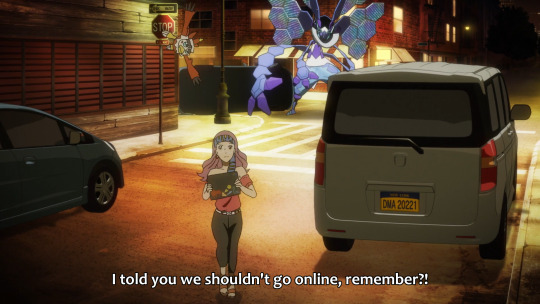
In general, the 02 quartet (my shorthand for the four human characters introduced in 02 who weren’t in Adventure, namely Daisuke, Ken, Miyako, and Iori) have a position in Kizuna that you can call “shockingly favorable” in that they’re kept safely out of the most dangerous parts of the plot in ways the others aren’t. This especially sticks out when we get to the Eosmon incident reaching its climax, when Takeru and Hikari are placed in the same situation as their Adventure seniors, despite the movie and its surrounding media generally portraying them closer in line with the others in the 02 group than the Adventure group.
To be a bit blunt about it, the obvious main reason the story is set up this way is meta -- a lot of the climax’s effectiveness depends on the audience getting sensory impact via recognizing things from the original series (including 02 as well; how convenient it is that all of the international Chosen are in the positions 02 fans would recognize!), and so it’s obvious that said climax would evoke imagery related to the series that was Digimon Adventure, while the 02 quartet would be treated extra-kindly by the narrative due to the need to give them compensatory action screentime given certain real-life events. But just because the originating reason is meta doesn’t mean there isn’t also a story reason for it, especially considering the relevance of 02′s themes in Kizuna’s narrative, and the surrounding circumstances regarding both series.
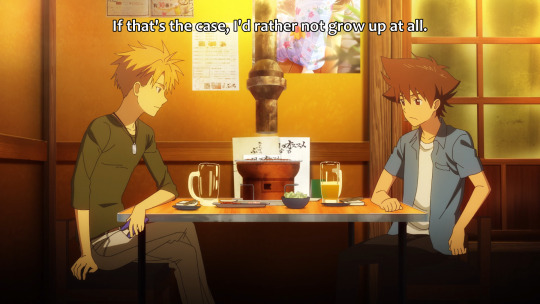
Before we get into anything else, the first thing that needs to be established is that Menoa and Eosmon’s lure is pretty obviously depicted as working on a subconscious level. This is why everyone else in the narrative agrees that what they did is “kidnapping”, despite her insistence that she’s just doing what they wanted. While they can’t not admit to having moments of weakness, nevertheless, it’s likely that most if not all of the people Menoa kidnapped consciously knew better and had learned better lessons than this a long time ago; if Menoa had consciously offered Neverland to her victims, most of them would have probably said no! But as Daisuke said back in 02 episode 49 -- when he witnessed his own friends being subjected to something similar at the hands of BelialVamdemon -- there’s no sin in having feelings of worries or troubles (and, by extension, irrational feelings in general), and Eosmon’s abilities and Neverland happen to be able to directly target them. In fact, we ourselves got to witness this internal conflict when Menoa made her direct offer to Taichi and Yamato to join Neverland; they briefly considered it because of the circumstances, but were snapped out of it quickly with Agumon and Gabumon’s intervention, and were really, really mad at themselves for considering it shortly after.
We saw the process of how Ayaka became one of the kidnapping victims at the beginning of the movie -- it happened right after she complained that she wasn’t fond of the idea of becoming an adult at this point. So it does lend some truth to the idea that Menoa’s working off something with these cases, and that Eosmon did specifically target people who had those wishes to some degree. Moreover, note carefully how this kidnapping (and some others in the movie) is portrayed; Eosmon doesn’t actually emerge from the device in question (it’s obvious that nobody notices the giant butterfly monster), and the victim’s consciousness and partner are whisked away thanks to being caught by the device camera. In Ayaka’s case, because her phone was sitting on the table, pointed at her. The fact that this is not how the kidnappings are portrayed all the way to the end of the movie is a very significant point.
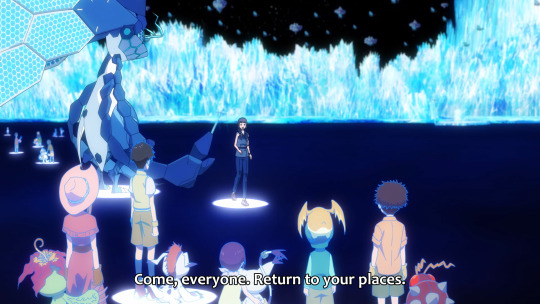
So let’s talk about Neverland and its construction. The whole thing is based on Menoa’s own very, very warped view of what “happiness” is. This means that Neverland is only an “ideal world” or “utopia” in a way that makes sense to her -- and once you learn the full extent of her backstory, it becomes apparent how she came to the mentality she did, and, more pertinently, how she ended up projecting that on everyone else. Hence, how she came to decide that she knew better and should decide for everyone, because she thinks she gets the right to decide on everyone’s happiness based on her own experiences. (She doesn’t.)
The way Neverland is constructed is that everyone has “their own places” -- their own individual islands that recreate “memories” of everyone being able to be together with their partner, forever. So in other words, it’s not just that everyone’s being turned into children; it’s that they’re being kept in an eternal loop of their best memory and unable to “move forward”.
Here are three very significant parts about this, which will be important to keep in mind as we go deeper into this analysis:
Menoa’s view of this utopia requires people to be separated -- for all she claims this is a utopia where people can play together, she discourages fraternizing and encourages everyone to stay only with their own partners. This is, presumably, to lessen complications with said memories, because what might be one person’s best memory might not be for another, and also because she thinks one person being alone with their partner is happiness enough in itself. As we’ll be seeing later, this is very much not the case for everyone.
A lot of these memories in Neverland -- and Menoa’s own mentality, as we eventually find out -- are heavily dependent on the concept of rose-colored nostalgia, or, that is to say, conveniently omitting or forgetting about all of the bad things about one’s past in order to portray it as such a wonderful thing that nobody should ever move on from. And in the end, that probably applies to real-life childhood in general, too; as much as it’s so often put on a pedestal for being a time when “everything was simpler”, you can also easily argue that it wasn’t actually all sunshine and roses, it’s just that the process of forgetting things or the grass-is-greener phenomenon makes you conveniently forget all of the bad things and frustration that came with it too.
Because the concept of needing to stay in the past forever is based on the idea that it’s preferable to growing up, these memories thus have a strong premise of “things you cannot do anymore” -- something that, bar going back to the past and never moving from it, you will never get back or be able to sufficiently recreate. It’s unlikely the islands themselves are one-to-one recreating their specific memories in the way they happened, but rather seemingly presenting them the opportunity to “constantly do over” things they want to recreate or do again, as long as those things are associated with a happy thing that isn’t as easily accessible anymore.
In the case of the five Adventure group members who were brought into Neverland, these “memories” that they’re seen trapped in are, of course, from Digimon Adventure.
It is of course foolhardy to pretend that the main reason for this wasn’t meta, since, of course, there’s a huge point to be made here about the relationship between Adventure and nostalgia, plus the simple fact that this is what we’re most likely to recognize and be nostalgic for, but it also makes sense within the context of the narrative; Menoa has an extreme bias towards the happiness of her childhood revolving almost entirely around her partner, and, of course, Adventure was when these kids first had their most formative meetings with said partners. (This is also probably the in-story explanation for why the other international Chosen from 02 appear at or close to their 02 selves; beyond the meta reason of it being a way to make them recognizable when we only knew them for such a short time, it also approximates when they met their own partners.)
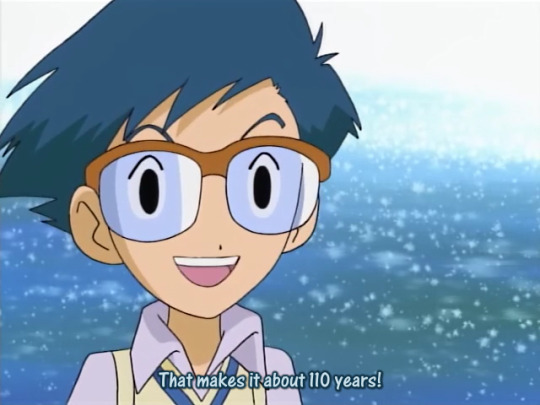
On top of that, Adventure was not all sunshine and roses for its cast! After all, there was a ton of drama and emotional trauma and stress from running away from enemies trying to kill them, or trying to save the universe, and glossing over that is also foolhardy -- but this is also where our concept of “rose-colored” comes in. Menoa’s not offering the kids the entire adventure; she’s offering them a small slice of the moments when they were able to be happy, the moments that made them want to stay in the Digital World for a whole 110 years’ worth of time at the end of Adventure -- she’s basically offering them that very thing they wanted and had ripped away from them at the end of Adventure when the time dilation phenomenon stopped. Take out all of the bad stuff, and suddenly, the events of Adventure seem outright romantic -- it’s the whole school of thought that fueled Adventure’s inspirations of Two Years’ Vacation and Stand By Me, in which a lot of stressful stuff happened and yet you still can’t help but think there was something magical and romantic about it. (I cannot emphasize enough how much of a cultural impact Stand By Me in particular had in Japan, to the point where it’s considered the epitome example of a “coming of age story” and “summer adventure”.)
Let’s take a closer look at what’s on each of the Adventure kids’ personal islands:
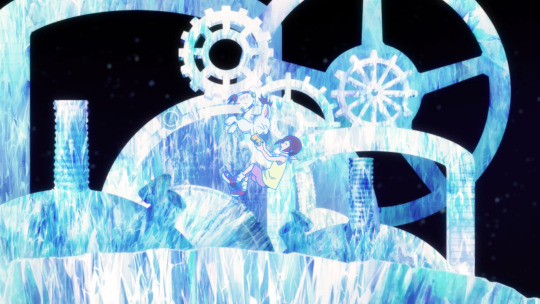
Hikari is probably the one in the most unusual position among this group, since she didn’t join until over the halfway point, and the first arc she got involved in revolved around everyone wanting her and Tailmon dead. Thus, the memory we get to see her involved in is the Numemon factory in Adventure episode 49. Although this was in the middle of the Dark Masters arc (and, uniquely, very close to the end of the series where a lot of stress was involved), due to the limited amount of time she got to be in the Digital World, this was the one time she got to do something really cool and awesome and impressive for herself that had nothing to do with the others (again: see how the requirements for these islands require not fraternizing with friends and being isolated).
One thing that the Adventure kids got to do that wasn’t in play in 02 was that there were a lot of “romantic experiences”, involving strange adventures and things like phone boxes on the beach, and, very significantly, “Digimon friends” -- ones that the kids made a huge note of bonding with over the course of the series. This contributes to a certain sense of whimsy that was involved in this adventure that the 02 quartet ultimately never ended up getting to foster, because the lack of the time dilation phenomenon meant that they spent much less time in the Digital World overall (more on this in a bit), and once the time dilation stopped, it meant that these kinds of “whimsical” experiences were ones the Adventure group was permanently torn away from once that adventure ended. That dropping of the time dilation phenomenon not only cut that initial adventure short, it also prevented any future ones like it from ever happening again.
And, of course, this is an extremely rose-colored memory, because shortly afterwards, the Numemon ended up all sacrificing themselves for Hikari. But hey, when you’re in a space that can eternally loop good memories forever, everything’s fine as long as we conveniently never get to that part, right?
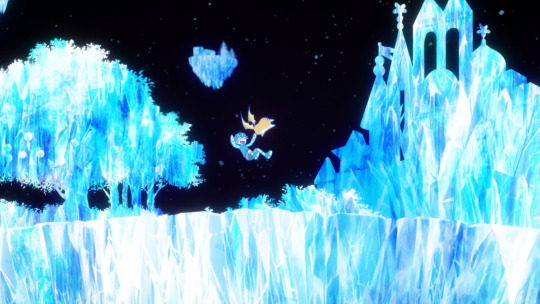
From this point on, you’ll notice that all of the memories that show up on these islands are from before the halfway point of the series, because after that, things started getting increasingly pear-shaped and much more difficult to disentangle the stress, mental breakdowns, and witnessing of deaths from. (Hikari’s probably wouldn’t have come from such a late incident if she hadn’t joined the party so late.) Although there still were looming threats around the horizon in the beginning of Adventure, they weren’t always immediately apparent to the kids at every turn, and in fact, the beginning of the series involved more of a “well, we’re in this situation and probably need to get home somehow” aura than it did a “the world is in danger and all of us might die” aura. (It’s also in direct contrast to the 02 group, who were given the details of the crisis and what they needed to do roughly from the get-go.) So in other words, if you want to have some rose-colored nostalgia about the romanticism of this adventure, these are some of the best episodes to pull from.
Takeru’s is obviously from the Village of Beginnings, corresponding to Adventure episode 12, when he and Patamon got to have a fun romp through the village, play together, meet Elecmon, and learn about how Digimon are born. It’s also very much something he did without the others, only with Patamon, and had a lot of “fun and happiness” associated with (later solo episodes with Takeru had a lot more upsetting events more intrinsically tied with it), and, again, it’s extremely rose-colored -- it wasn’t even a day later when Angemon died in front of Takeru’s eyes. But hey, that’s even more reason to pick a moment from before then to stay in forever! Can’t have trauma if that trauma never happens, right?
Also, note that Takeru is one of the few here who’s confirmed to be aware of the partnership dissolution issue at this point, and, unlike Koushirou, isn’t confirmed to have accepted a forward-thinking mentality about it yet -- this is a very, very prime time for his fears of being separated from Patamon again to have a nasty relapse.
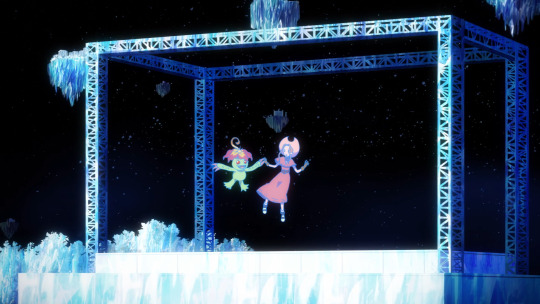
Mimi’s is the closest to the midpoint of the series, from the affair with the Geckomon and Otamamon castle (from Adventure episode 25; the metal railings here resemble the stage railings from that episode). It’s from the period of time that was a “lull” -- when nobody actually knew about the encroaching threat of Vamdemon quite yet, and for all it was worth, there was no longer any danger. So Mimi got to live happily in the comfort of the castle and play around with the Geckomon and Otamamon...which, of course, also conveniently excludes the affair where she went on a power trip, made everyone miserable due to her selfishness, and immediately felt guilt over it.
Mimi’s associations with this incident are not entirely negative; she was clearly still having fun singing for them in the end (note how her clothing during that scene involved her regular outfit, which she has on here), and she still had a positive impression of her relationship with the Geckomon and Otamamon as per Adventure episode 47 and 02 episode 6 (and as per 02 episode 15, even though everyone’s initial encounter with TonosamaGeckomon ended badly, nobody actually has any lingering grudge against him). So if you filter out that whole affair with the power trip and the resulting embarrassment, it was a meeting with a bunch of fun Digimon friends, a romantic little castle, and a fun stage session where Mimi got to sing.
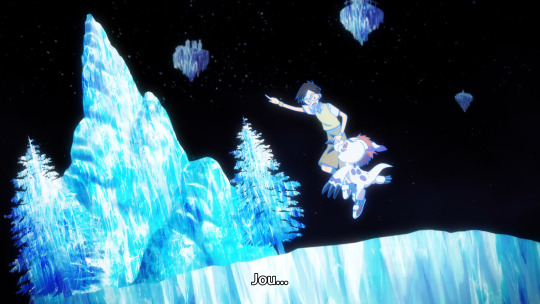
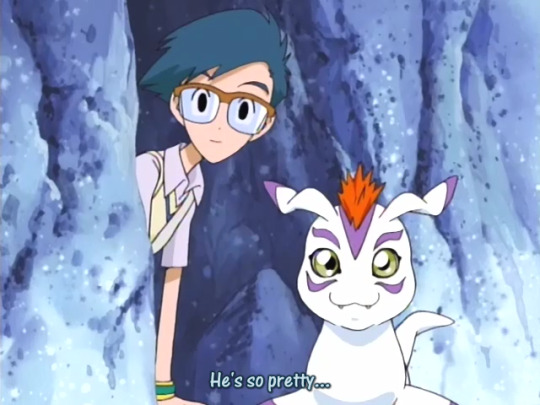
Jou’s refers to the Infinity Mountain incident in Adventure episode 7, and even from the get-go you can already see the level of rose-coloredness in Jou’s gesture -- in the actual incident depicted, Jou went to the mountain out of a sense of obligation and stress, and the initial climbing involved him having a bit of a bickering moment with Gomamon. But once they did get up there, it was actually their first time the two of them got to really “bond” -- and not only that, their encounter with Unimon had Jou even look on it with fascination, before the Dark Gear had ever come into play.
So in the end, Jou really would have found the incident enjoyable and worthwhile if not for that, and from there you can understand why it would be appealing for him to revisit that setting and finally get to have a bit of calm fun with Gomamon there -- especially since, again, the Neverland islands have a very strong preference for isolating the kids from others, and this was one of the few times Jou got to have a major moment of calm like this alone with Gomamon, with a slight reprieve from the constant feeling of stress and duty.
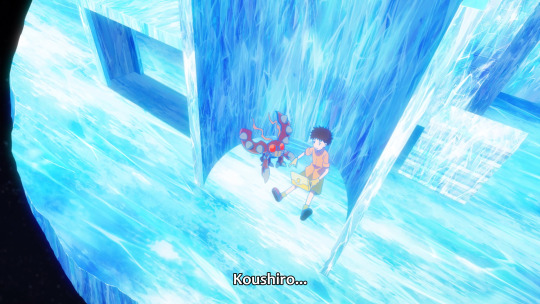
Koushirou’s most prominently resembles the “sealed room” in the factory in Adventure episode 5, and while Koushirou certainly continued to make a large number of exciting discoveries after that, this was the situation where Koushirou, with no one else but Tentomon to worry about in the immediate vicinity, got to have the largest sensation of “novelty” -- where he first came upon the fascinating discovery of data manipulating reality around him, and he actually got to see the world change around him by wiping things off a wall.
And, of course, there were other things going on like Tentomon confronting him with his first existential crisis, and how things quickly went south with Andromon...but we don’t have to remember that part for now, right?
An interesting thing about Koushirou: the circumstances of how he was “kidnapped” in the first place are actually somewhat obscured compared to the other four in this scene, since Menoa presumably needed him conscious in order to get his list out of him, resulting in his kidnapping scene also involving an emerging Eosmon and not having him be instantly taken the way we see Takeru and Hikari (more on this in the section below). It’s thus unclear whether he’d be in their boat had his position in Menoa’s plan not been unusual -- said memories in Neverland involved “gathering information and learning more”, something he still actively involved himself with even after the events of Adventure, and he’s also the first one to reach a forward-thinking mentality about the partnership dissolution phenomenon. Either way, once he was already dragged into Neverland, it’s natural that the place could find a good memory for him in the same way it did for the other kids who were “manually” dragged in, but the actual method of entry and whether Koushirou's post-Adventure life put him in a mindset similar to that of the 02 quartet (again, see below) is a bit ambiguous.
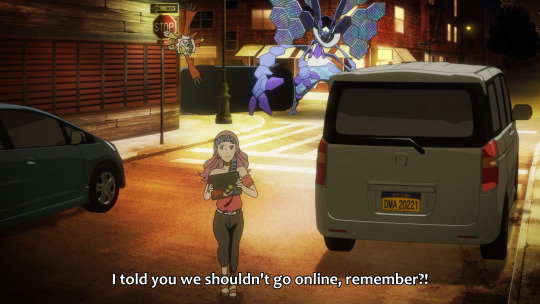
So here’s an interesting part about how the 02 quartet gets involved in this story: their own encounters with Eosmon happen during a part where the method of kidnapping has abruptly changed. As many have pointed out, this is also when the degree of the targets Menoa wanted had also suddenly escalated, because while her previous claims had involved the idea of kidnapping like-minded adults (who, indeed, were entertaining thoughts of nostalgia to even some degree), she was now kidnapping actual children, ones who weren’t even nearly at the point of the supposed drudgery of adulthood that Menoa claimed they would eventually have, and with her arrogantly deciding she knew better for all of them. The part that becomes particularly intriguing about this is that the exact same thing happens with Miyako -- she is explicitly stated to have connected her laptop to the Internet, resulting in an Eosmon physically emerging and chasing her instead of instantaneously snatching away her consciousness through a camera like her own fellow 02 group members Takeru and Hikari.
So in other words, the 02 quartet’s favorable position in this incident doesn’t just have to do with being lucky enough to have gotten Koushirou’s warning about the Eosmon early; they (or at least Miyako) also seem to have a certain degree of outright immunity to it, much like the young children who aren’t old enough to have nostalgia yet. (Also, keep in mind that Takeru was caught thanks to a security camera; “excess caution with electronic devices” alone wouldn’t necessarily have guaranteed their safety.)
Recalling that, for the most part, Takeru and Hikari are usually treated more like 02 group members in the context of this narrative yet are, in this one case, treated as being potentially nostalgia-prone, it stands to reason that the main difference between the two of them and their fellow members in the 02 group is the fact that Takeru and Hikari went on the adventure in 1999, and the quartet did not. So in other words, the reason the 02 quartet isn’t as prone to this is not so much that they’re fundamentally different-minded people, as much as they have a distinct lack of an experience they can be attached to the way the Adventure group is to their own 1999 adventure. (Remember that Menoa’s kidnappings work heavily on subconscious feelings; you can’t blame anyone for having these kinds of feelings no matter how much they’ve consciously learned.)
As I said earlier, it’s foolhardy to pretend that Adventure was all sunshine and roses, and, likewise, it’s also foolhardy to pretend that 02 was nothing but suffering for everyone involved. Both series involved a lot of balancing of funny, silly moments to be treasured as much as they involved stress (which is why people are so attached to both, after all). So the question is not so much how happy they were in their childhoods as much as the nature of what that happiness came from, and what relation it has to their current lives. And when you look at what experiences the 02 quartet had back in 02, you might notice a thread of the fact that it is significantly harder to romanticize the events of 02 than it is Adventure.
Let’s put it this way: Let’s say that the 02 quartet was kidnapped into Neverland and placed onto islands that fit Menoa’s view of happiness. What, exactly, would you pick from 02 itself that would work? What kind of “happiness” did they have back then that’s so romantic, so impossible to replicate now, that they’d want to go back to because it’s better than their lives now once you disentangle all of the bad stuff?
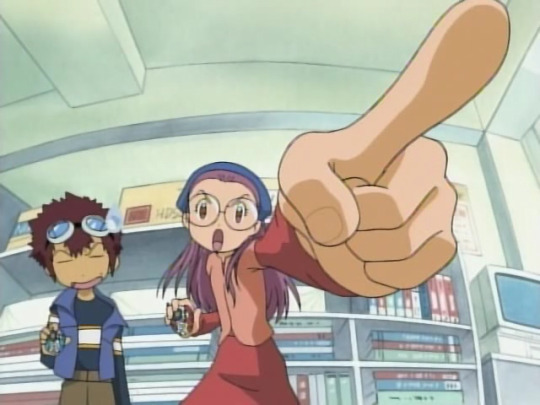
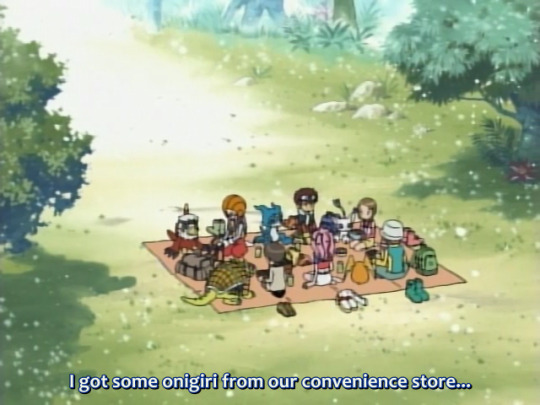
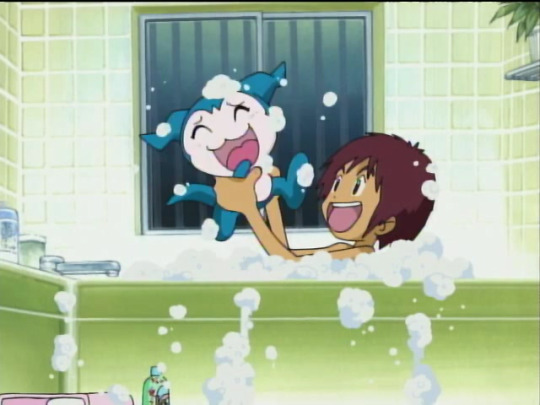
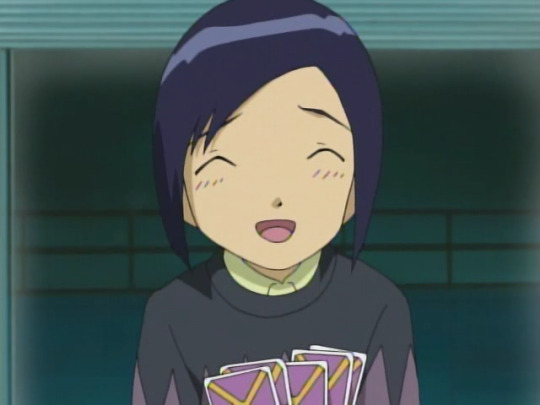
...Not much. Not much at all, actually. Hanging out in the computer room together? Doesn’t seem like they cared that much about the computer room part as much as the fact the others were there bantering with them (which would put a huge nail in Menoa’s islands mandating isolationism). Going out on a picnic together? No reason they can’t just go on another picnic again (and if the BD box is to be believed, that’s exactly what they did, and they even added Ken to it while they were at it). Hanging out with their Digimon in real life and doing silly hijinks? They’re...probably still doing that now, actually. Getting to find true happiness at a Christmas party? That’s a party from the real world (again, something they most certainly continued to do thereafter), one where the happiness came not from the romanticism of anything that happened to do with some adventure, but just the happiness of being surrounded by true friends, which, again, Ken is still clearly getting to do by the time of Kizuna.
Once you look at the circumstances of what the “adventure” of 02 was to the 02 group, you may realize that it doesn’t really resemble the traditional romantic image of an “adventure” much at all. Sure, they were blessed with being able to regularly go back and forth between the Digital World from the get-go, but it meant that -- especially without the time dilation in play -- the Digital World became much less of a picturesque area associated with a one-time memorable adventure as much as something they had to squeeze in their after-hours while juggling it with their school. The circumstances they encountered their Digimon and the Digital World in were at a point where it had a certain level of “mundane” to them, compared to their seniors; it wasn’t a “fantasy adventure in the Digital World” when so much of the story also revolved around real-world events as well, and you can’t really find many “mysterious fantasy” events in 02 that resemble much of those in Adventure. The closest might be...Daisuke seeing Numemon pile out of a vending machine in 02 episode 1? (Not very romantic.) Daisuke getting chased around by a Tortomon in 02 episode 22? (Really not very romantic.) Iori getting to tour the ocean with Submarimon? (Implied to more about relief from how much he was holding himself back than the uniqueness of the experience in itself.) Ken’s long-time-ago flashback from 02 episode 23 about meeting Wormmon for the first time? (Defeating a Gazimon is hardly that impressive; the important part was him bonding with Wormmon, which he’s...uh...still doing now?)
There weren’t any lasting relationships with Digimon friends like the ones in Adventure, maybe encountering some civilians once and not seeing them much again after that, especially since the lack of time dilation meant not getting to spend as much time visiting them much at all (think about all of the really fun experiences that the Adventure group probably had that weren’t shown in the actual Adventure TV series, just because it probably didn’t have enough drama that would make a good TV episode plot). This means that there’s very little, if at all, of 02 that represents something this group would want so badly to recreate that they can’t already do now; everything from back then was either something comparatively mundane, or something they actually would not want back. Unlike with Adventure, where a lot of the kids had irreplaceable moments that only happened to be spoiled a bit later, a lot of the “really awesome accomplishments” from the first half of 02 were explicitly against Ken, someone whom they’d probably rather not dwell on fighting again because of how much they love him now; many of those good memories are “retroactively poisoned” because of that, and it’s much, much more difficult to make a rose-colored version of those memories disentangled from the bad, because of how fundamentally intrinsic that retroactive poisoning becomes.
And, when you think about it, the mandate of “you have to be alone on your own island” would pretty much break these four in particular, especially since the 02 group is portrayed as the type to need mutual support more than anything else, and so many of the events that represent “happiness” specifically involved the happiness of each other being present. It’s not to say that the 02 quartet had no moments of happiness when alone with their partners, but, rather, being with each other provided so much more fulfillment to them that Menoa’s offer of a memory of their past that requires them to be alone probably pales in comparison to anything they could do now in each other’s presence. Maybe, like with the other kids depicted in these scenes, they could be buttered up with something nice if you successfully got them into Neverland, but it’s not like they have any real wistfulness about anything from back then to the point that they’d be subconsciously drawn towards it instead of having to be dragged in kicking and screaming -- and especially in the case of Miyako, the same one who managed to evade an Eosmon here, who was offered a similar “chance to be alone” back in 02 episode 49 and didn’t take very long to decide she hated it because of how much of her happiness comes from getting to be with others.
By the time of the end of Adventure, the Adventure kids’ ideal situation was to have a romantic and fun 110-year adventure with the sights and fun of the Digital World, with all of the weird fantasy surrealism and less of the world-saving, and that’s something they never got to have (and that Menoa was inherently offering them). By the time of the end of 02, the 02 quartet’s ideal situation was...to find a way to get back to normal life and hope their friend feels a little better, and that “ideal situation” is still persisting even into the time of Kizuna, so it’s hard to imagine they really want more than that.
And, again, when you extrapolate this into what Kizuna’s trying to say about real life, adulthood, and nostalgia: it is true that Menoa’s projecting a belief that absolutely does not apply to everyone. While it’s true that many people feel that childhood had a certain kind of magic that you can’t get back in adulthood, there are possibly just as many people who aren’t really all that nostalgic to begin with, either due to trauma or something about their childhoods being miserable, or, even in the lack of such miserable events, simply enjoying the added freedom and expanded range of ability that comes with adulthood to the point they consider it to be more than worth the tradeoff. The 02 group basically represents this crowd -- Ken’s life right now beats out his past in pretty much nearly every respect, and while there are certain concerns about not being able to meet up as often, they’re finding the same ways to do the same kinds of over-the-top hijinks they did back in 02, with arguably even more range now that they get to exploit Digital Gates to do world travel and act without worrying about their parents. They’re basically like the adults who see Menoa’s creed of “childhood is better because adulthood sucks” and go “sorry, can’t relate.”
That said, remember: this isn’t because the 02 quartet is somehow mentally stronger or anything, but rather just a byproduct of what experiences they've had and haven’t had. Takeru and Hikari’s position is unique here -- for all intents and purposes their mentalities are portrayed as closer to the 02 group’s, but they did still have the experience their seniors had and are thus still capable of being close to their position in this one regard. In the end, everyone is different, it’s no sin to have feelings based on those differences, and “being able to relate” to one’s position is also an important key here; because the 02 group’s position is so alien to Menoa’s, it’s unlikely they could have tackled her problems nearly as intimately as their seniors could.
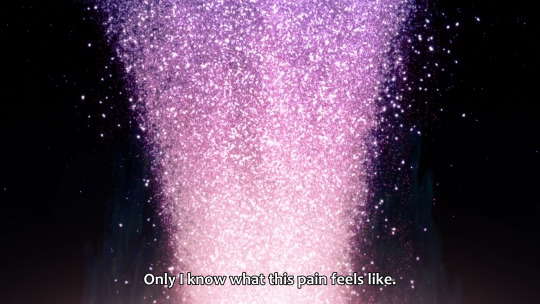
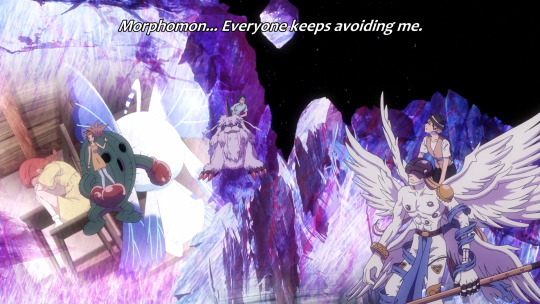
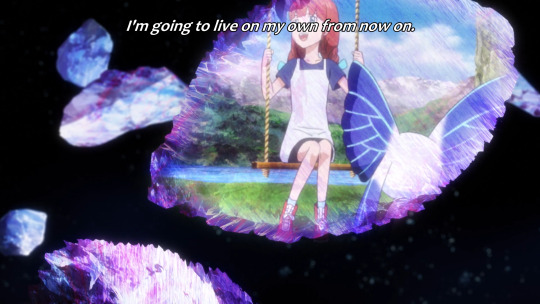
What we learn about Menoa’s backstory establishes that she forced her vision of nostalgic happiness on everyone based on her own perception of her past in such a warped, rose-colored manner. She conveniently omitted or forgot about details such as the fact that her life as a “child” involved feeling ostracized from everyone and that she herself was guilty of neglecting Morphomon. Not only that, she herself claims that she’s the only one who knows what this feels like -- that nobody relates to her -- and thus, you can see that she came to her conclusion that her experiences are universal by the power of sheer extrapolation, hence why she thinks everyone inevitably loses their partner upon reaching adulthood despite pretty significant amounts of evidence to the contrary. (For all it’s worth, the fact that she still considers herself as having “become an adult” at 14 just because she got into university at that time is pretty conceited.)
Menoa’s existence as being so starkly in contrast to the 02 quartet’s is very likely because her entire character was built up from the ground that way -- her entire backstory of skipping grades into university is heavily based on 02′s initial development premise and Ken’s own backstory, meaning she explicitly represents the path that Ken and the other 02 kids chose not to take, and the timing of certain events in her backstory seems almost deliberately engineered to prevent her from witnessing some of 02′s important answers to Kizuna’s conflict, most notably her inability to witness the final battle and the important lessons everyone present learned about following one’s dreams without restraint, and how that relates to one’s partner. Menoa’s mindset is basically that level of incompatible with 02′s themes of “moving on from the past” and “not caving to arbitrary societal expectations”, to the point her character could only get to this point by going out of the way to exclude her from 02′s story and events, because she’s fundamentally built as a character who started off on a very similar path as them (getting to integrate her Digimon partner into normal life, having a similar backstory to Ken) before veering off on a very different one.
Moreover, about that backstory, and the reason why 02 was conceived as such a criticism of the concept of “skipping grades into university”: the concern that someone in this position will be kept from making any friends their age. Menoa puts the moment of “being with one’s partner” on such a pedestal and considers herself to be “the only one who knows what this feels like” partially because she has a fundamentally warped view of friendship itself. Even the Adventure group, which may not have had quite the absurdly tight level of bonding the 02 group had, still broke out of the illusion via Taichi and Yamato reaching out to them, and Taichi and Yamato giving each other mutual support helped them make the decisions they did in the movie. The movie is titled “bonds”, and “bonds” doesn’t just refer to those between human and Digimon partner, but also bonds between each other; Taichi, Yamato, and Sora slowly drifting away from the others at the start of the movie has very strong relevance to their respective existential crises, and the role that Taichi and Yamato play in supporting each other, and Mimi’s in supporting Sora in To Sora and even beyond that, say a lot as to how they’re already expected to be much better off than Menoa was.
It’s not that adulthood is inherent drudgery; it’s that Menoa’s own circumstances really are that warped to the point where she sees her very unusual experiences as fundamentally synonymous with how life is supposed to work in general. She was so obsessed with “being independent”, “being useful to the world”, and “being on her own” that she had no mentality of making friends or connecting to others besides her own partner, and once her partner disappeared, she seemed to make no attempt to rectify that. So of course her life in university following that ended up being not nearly as fulfilling as she’d hoped, since she was getting no real emotional support from anywhere, and, as 02 itself also drove home, apparent “approval from society” only ever makes you as “happy” as a Dark Seed-implanted child if you’re not also being supported by your loved ones in the process. Her adulthood sucked, and she decided that everything about her rose-colored childhood meant that childhood is fundamentally superior in every way, and thus decided that keeping everyone else in it would be “saving” them from the terror it involves -- even though (even if they’re not aware of the specifics of everything) the 02 quartet is not the kind to be able to relate to this at all, and, eventually, Taichi and Yamato, who do understand her position a bit better due to their own experiences, are able to get her to reconsider a little.
#digimon#digimon adventure#digimon adventure 02#digimon adventure last evolution kizuna#kizuna spoilers#shihameta
108 notes
·
View notes
Text
Self Centred Improv: A Brief Analysis of Wilbur’s RP Style, And How It Limits The Dream SMP
okay first of all this is not an attack on Wilbur’s character! these are all mistakes that are very common for amateur improvers/role players, and absolutely do not make him selfish or anything like that. it’s also something that could honestly be fixed so easily, so if you could share this around it would be much appreciated
anyway, my thesis is basically that Wilbur is a very self centred role player and that is severely limiting the potential of the Dream SMP and putting other content creators in awkward positions. what do I mean by that? well, there are two main aspects:
1) The ‘yes and’ rule. if you’ve ever even dabbled in rp or improv before, you would have heard this rule. it basically goes like this: if someone else in the game suggests something? you never, ever say no. never cut it down, never save it for later. instead, you embrace it and try to figure out how you can build on it: “Yes, and-“. Wilbur doesn’t always do this, and that’s a very unfortunate mistake because it often happens at the expense of other creators.
for example, let’s look at the Eret redemption arc. once Wilbur and Tommy were kicked out, Eret practically immediately approached them with an offer of support. it was his redemption arc. Wilbur and Tommy, though, refused him because they didn’t feel it was the right time in the narrative for that. as a result, Eret’s now in...limbo. we all know the redemption arc is coming, so when it does happen it won’t be nearly as impactful, but even until then Eret is just sorta...waiting. waiting for Wilbur to decide that he can fit into the story again. a similar thing happened to Techno, where Wilbur spent a while being reluctant to accept his support. it was only with Tommy’s prodding that he finally agreed, and Techno could join the server. luckily Techno’s limbo was a lot shorter than Eret’s was, but it still let the hype from his tweet die down a little, and that’s a big shame.
again, please do not take this as Wilbur being selfish. that’s absolutely not the case. he’s just falling victim to a very common trap for amateur improvers, and as a result inadvertently throwing his fellow creators under the bus. to go back to the Eret example, if he’d accepted Eret’s immediate offer then Eret would have the opportunity to expand on his character, while Pogtopia would have a completely unexpected dynamic thrown into it that they could use to build their own narratives. it’s so much more interesting. but unfortunately, that’s not happening, and that’s because of the second aspect:
2) Pre-planning the plot. it is very tempting for new role players to have certain plot beats pre-prepared, but this is actually heavily discouraged among the community. because your plot beats are always going to be centred around your own character and their arc, and so you’ll turn down opportunities from other creators that could enrich the storyline and make for a more unexpected, more high stakes experience.
for example: currently, Wilbur has mentioned that he will only allow one other creator per stream to join Pogtopia, and when Tommy tried to suggest otherwise Wilbur broke character to say that Tommy was making the story move too fast. the problem with that is, the story shouldn’t be able to move too fast because the story shouldn’t be set in stone right now. Wilbur, i presume, sees the storyline being other creators gradually joining Pogtopia over time until there’s one big, grand finale. which is a great story!! but predictable, and small scale, and centred around Wilbur and Tommy’s characters. it’s predictable because all the audience knows about it, so there will be very little hype when Niki and Eret etc join the gang. it’s small scale because it’s from the mind of one creator, and leaves very limited opportunities for unexpected factors to change up the plot or challenge the characters. and it’s centred around Tommy and Wilbur because, until they decide otherwise, all the others just have to wait. and their audiences have to wait too.
one of the best parts about minecraft RP and the Dream SMP is just how random everything is. how stupid it is to have such dramatic occurrences and massive stakes in a minecraft game. if Wilbur keeps saying “not yet” instead of “yes, and-“ then these unexpected and dramatic happenings will be a lot less common. some of the best moments on the server are those that Wilbur didn’t plan for (Eret’s betrayal, Schlatt’s victory etc) but they went along with it and used it as a stepping stone to develop the storyline. i feel like, if we want the Dream SMP to not get stale, that will have to become the common response to all contributions from other creators as well.
anyway, i don’t claim to be an expert in the area. i’ve been role playing for about 5 years now, but have no formal education in it and am going purely off of what i’ve observed and been advised of throughout the years. i also apologise if these seemed harsh or condescending, because i’m honestly just trying to offer a different perspective. i very much doubt any of this will actually reach anyone on the SMP, but if it does i hope they take it into consideration ^-^
#dream smp#wilbur soot#wilbursoot#tommyinnit#pogtopia#eret#nihachu#technoblade#l’manburg#dreamwastaken#jschlatt#tubbo#sleepyboisinc#sleepy bois inc#dreamsmp
395 notes
·
View notes
Link
Why do so many young women hate feminist trailblazers like me?
For anyone uninitiated into the various waves of 21st-century feminism, this will no doubt come as a shock. But in my opinion, what passes right now for modern feminism is doing women more harm than good.
Many young women today are not only pandering to men in their so-called feminism, but seem utterly unconcerned that the hard-won rights achieved by older women in the 1960s, 1970s and 1980s are at risk of being catastrophically eroded.
They are helping everyone but themselves. In many ways they are betraying everything I and my brave colleagues fought for. This is the worst clash across the generations I have witnessed since coming to feminism in 1979, aged 17.
In universities around the UK and beyond, women are being fed a type of faux feminism, often by men reluctant to lose any of their privilege.
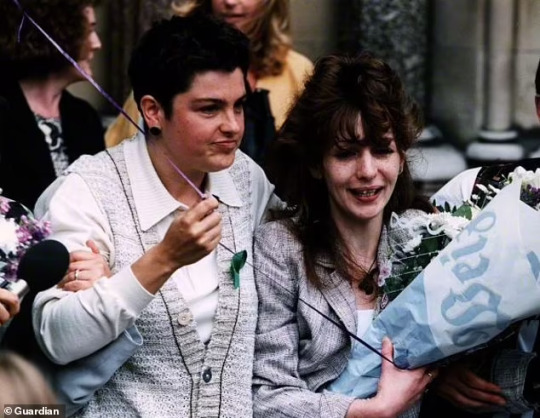
Julie Bindel, who came to feminism in 1979, says the rights achieved in the 19060s, 1970s and 1980s are at risk of being catastrophically eroded. Pictured: Julie (left) with Emma Humphreys in 1995 after a campaign to free her from jail for killing her violent partner
These women are being bullied and cajoled into accepting nonsensical concepts that are, at best, naive and, at worst, downright dangerous.
Prostitution, say these young women, is a job just like any other. They also argue that pornography is liberating. And finally, that trans-women should share female-only spaces such as hospital wards and domestic violence refuges.
This last makes me want to weep. It was women of my generation — often called second-wave feminists — who, 50 years ago, built rape crisis centres and refuges with no funding or salaries. To see them being dismantled by the very women who may one day need them is heartbreaking and infuriating.
I don’t think these women — almost all of whom would call themselves feminists — realise they are complicit in eroding our rights, for the simple reason they are no longer taught feminist history in universities. Instead, they are fed a sop of incomprehensible post-modern claptrap by ivory tower academics.
Feminists of my generation are not just ignored, but actively disparaged — or worse.
Since January 2004, when I offered an early opinion on the trans issue for a national newspaper, whenever it becomes public that I am about to speak at an event, always about an aspect of male violence and always as part of my campaigning work, a mob forms with the aim of bullying the organisers into un-inviting me. This is always played out in public and it is always humiliating. Sometimes the organisers capitulate.
I have been invited then uninvited from numerous events at universities following protests from trans activists and supporters of ‘sex work is work’ politics. I have also been invited to, then de-platformed from a number of events exploring free speech.
By contrast, genuine achievements of the past go unrecognised. From the very beginning of my involvement in the women’s liberation movement, we were out on the streets, waving placards, carrying banners and shouting through loudhailers, protesting the laws we wanted to change.

Julie said feminism has been rebranded and repackaged as ‘just be kind and nice to everyone’. Pictured: A 1970 women’s liberation protest
It was our campaigning that led to the introduction of the offence of coercive control; that barred the use of a woman’s previous sexual history in rape trials and ensured anonymity for the victims of sexual assault; and outlawed rape in marriage, which — young feminists are often astonished to discover — was perfectly legal in England and Wales until 1992.
Absurdly, there is no longer any expectation that being a feminist requires you to do anything feminist at all. Instead, and ironically given my experience, feminism has been rebranded and repackaged as ‘just be kind and nice to everyone’. Young women are told it is simply about the ‘choice’ to be who you ‘want to be’.
But if feminism is about choice, what does this mean for the women and girls who don’t have any? The girls forced into marriage, the women pimped out by violent boyfriends, the women on benefits living in temporary accommodation with young children they can’t afford to feed?
For feminism to mean anything, it has to be for all women and not just the privileged few.
Do young women even know about ‘the battles we’ve fought for them
You might ask, as many young women do, what is there still left to fight for? Although my generation of feminists and those that came before chalked up numerous victories, women are far from liberated. Levels of male violence towards women and girls are off the scale, as we have seen with the tragic events of recent weeks.
Conviction rates are so low that rape has been more or less decriminalised. Sexual harassment is endemic in our secondary schools and still a problem for many women in the workplace.
Many young women claim to be feminists, but seem to spend their time dismissing those of us who do the work — as opposed to simply talk the talk — as ‘irrelevant’, ‘bigoted’, and ‘past it’. Do these women even know about the battles we’ve fought and won to afford them some freedom?

Julie said in the current climate of misogyny, many young women are turning on feminists like her rather than pointing the finger at abusive men. Pictured: A rally to celebrate International Women's Day in 2020
In 2018, for example, Ash Sarkar, a media commentator, tweeted about the proposed changes to the Gender Recognition Act, claiming the introduction of ‘self-identification’ would not have any effect on the rights of others. I replied: ‘Unless you are a female in prison, one of the most disenfranchised groups on the planet of course.’ It was a reference to the case of Karen White, the transgender sex offender placed in a female prison who went on to sexually assault two female inmates.
When, in reply, Sarkar claimed ‘bigots’ like me didn’t ‘care about women in prison’, it was too much. Had she known her feminist history, she would have been aware that I am the founder of Justice for Women — a campaign I began in 1990 — and have helped countless abused women get out of prison.
When I came to feminism, there were no laws protecting lesbians from discrimination and abuse; violent men often won custody of children when women left a marriage; and domestic violence was treated by police as a ‘private matter’. All of this changed because of active feminists, as opposed to those who sit on social media virtue-signalling.
In fact, a woman reporting rape five years ago had a much better chance of seeing justice done than she does today. There were 1,917 fewer rapists convicted in the year to December 2020 than in 2016-17, a decline of 64 per cent.
In the current climate of misogyny, many young women are turning on feminists like me rather than pointing the finger at abusive men. Yet there are young feminists doing invaluable work to challenge male violence and bring about women’s liberation.

Julie said social media activism isn't the answer, as the #MeToo movement is no substitute for action. Pictured: A women's liberation protest in 1971
The campaigning group We Can’t Consent to This, which successfully abolished the ‘rough sex’ defence so often used by men who kill women, continues the work I was involved in as a young feminist when we, too, abolished the insidious defence of ‘provocation’, used by a number of men who’d killed their wives because of ‘nagging’ or alleged infidelity.
Of the 1,000-plus women attending the 50th anniversary of the Women’s Liberation Movement conference in London, in February 2020, a minority, but significant number, were in their 20s.
And when I launched my new book last month in London, well over 100 of the 250 books I signed were for women under the age of 30, with some in their teens.
Right now, we need feminism more than ever, but not the kind that puts men first. In the real world prostitution is not a liberating career ‘choice’, and increasingly violent pornography is not ‘sex-positive’.
Neither is social media activism the answer. The #MeToo movement is no substitute for action. Let’s point the finger at men who rape rather than expecting yet more women to lay bare their horrific experiences.
We live in a world in which rape, femicide and everyday abuse and harassment are ever present.
To change it, we need to be united and not divided by generational conflict. Somehow, and urgently, we must find a way to bridge the gap. Fighting among ourselves wastes time — and there is no time to lose.
Feminism for Women: The Real Route to Liberation, by Julie Bindel, (£16.99, Little Brown) is out now.
15 notes
·
View notes
Text
Van Zieks - the Examination, part 6
Warnings: SPOILERS for The Great Ace Attorney: Chronicles. Additional warning for racist sentiments uttered by fictional characters (and screencaps to show these sentiments).
Disclaimer: (see Part 1 for the more detailed disclaimer.) - These posts are not meant to be taken as fact. Everything I’m outlining stems from my own views and experiences. If you believe that I’ve missed or misinterpreted something, please let me know so I can edit the post accordingly. -The purpose of these posts is an analysis, nothing more. Please do not come into these posts expecting me to either defend Barok van Zieks from haters, nor expecting me to encourage the hatred. - I’m using the Western release of The Great Ace Attorney Chronicles for these posts, but may refer to the original Japanese dialogue of Dai Gyakuten Saiban if needed to compare what’s said. This also means I’m using the localized names and localized romanization of the names to stay consistent. -It doesn’t matter one bit to me whether you like Barok van Zieks or dislike him. However, I will ask that everyone who comments refrains from attacking real, actual people.
Part 1 Part 2 Part 3 Part 4 Part 5
And here we have the second half of The Unspeakable Story, because the case was so long I had to split it into two.
Episode 5: The Unspeakable Story – Part 2
When we last left off, Gina was allowed to testify about the omnibus murder two months ago. Sure enough, she talks about what really happened and how she was threatened into lying in court of law. The judge realizes that he made a grave error in letting McGilded walk. Again, I'm not sure why he's only realizing this now when that trial ended in disarray, with the entire gallery shouting about whether it was or wasn't a gross miscarriage of justice.

I'm giving Van Zieks an additional scumbag point for this remark, since Ryu had already admitted to his wrongdoing and, despite Van Zieks's repeated warnings of 'are you sure about this', brought the details of the falsified testimony up himself. Don't pretend to be understanding about the position this puts Ryu in if you're going to be a jerk about it afterwards, Van Zieks.
Some shenanigans and Gregson whispering to Graydon later, Scotland Yard returns with the small box! Turns out it's a music box! When suggested that the court should listen to the music on the disc, Gregson interjects and unconvincingly claims the music box and disc are unrelated to the case. Ryu objects to say that the disc is fundamentally important for understanding the motives of the crime and Van Zieks, on his own accord, chimes in that the prosecution has no objections. When Gregson continues to stammer that the disc is police property, Van Zieks says:

“But it is policy of this prosecutor to leave no avenues unexplored. And you, Inspector, have no jurisdiction here to prevent that from happening.”
So Gregson and Van Zieks are definitely not buddies. Since Gregson is a key player in this case (and I mean that in a negative way, since Gregson is actively hiding important knowledge from the court), the fact that Van Zieks is turning a deaf ear to his pleas does in fact make Van Zieks an accomplice of ours in a roundabout way. Only for this particular context, though. The point is, so long as the prosecution continues to agree with the defense about unveiling key pieces of evidence, Van Zieks is helping Ryu achieve his ultimate goal. Also it's just plain fun to watch Gregson panic. We're having a jolly old time in this courtroom!
Unfortunately, when the box is played, there's no music. It's just weird tones. So Ryu is confronted with the question of whether the music box's sounds are relevant to the case or not. Naturally, I chose that they aren't relevant to see what would happen. I don't know why I expected any different than this:
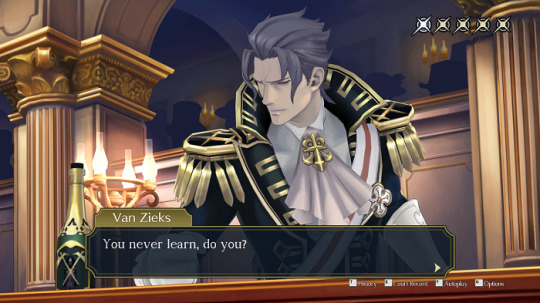
“When you speak, you must mean what you say. ...Or be prepared to suffer the consequences.”
Penalty from Van Zieks! He's right though, I never learn. Okay, so let's say the tones are relevant. Van Zieks jumps onto that like a cat pouncing on a mouse toy, of course. He wants to know just what that relevance is. Ryu says that the chimes aren't necessarily music, and Van Zieks pursues relentlessly. “Well, now that you've told us what they are not, I'm sure the court would like to hear what they are. Do enlighten us, my Nipponese friend.” This is all very standard fare, of course. In any Ace Attorney game, the player has to outline their reasoning in steps, which means the prosecution and/or the judge will continue to ask for elaboration until all the details are out in the open. Of course, Van Zieks has to be a jerk about it as he follows it up with the words “Surely you have an idea in mind? Because if not... It will be the death of your ill-formed argument!” Eesh. Harsh wording for such a simple concept of 'your argument is void if you don't tell us exactly what you mean'. What's bothersome about these moments is that often, the player already has an exact idea in mind, but the game's dialogue will beat around the bush a bit more and really rub it in. (example: Iris telling Ryu at this very moment that the music box isn't broken at all and it's meant to play these particular chimes.) But because the player isn't given the option to just figure this out for themselves and then gets scolded by the prosecution for 'taking too long', naturally the player may get frustrated.
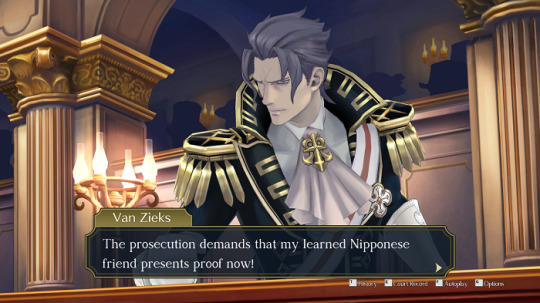
I'm getting there! SHEESH! It's not my fault Iris is distracting me! I had the evidence ready to present like two minutes ago!
Anyway, Ryu finally links the chimes to government messages being intercepted and leaked to other countries. These messages are usually telegraphed in morse code, so it should be obvious where Ryu's going with this. Van Zieks looks horrified at the notion of the disc containing secrets in morse code. Still, alongside Ryu he works through the logic of what happened and how McGilded would've been involved in this. Graydon, who works at a telegraph office, is of course the prime suspect for intercepting those secrets and that's the reason why he broke into the pawn shop to recover the disc. Graydon is outraged by the accusation, saying “I've had to stand here in silence while that pretentious foreign lawyer has been prattling away!”, but Van Zieks cuts him off with an objection.

“The prosecution demands the witness testifies... in response to the accusations brought by the defense!”
It's Mrs. Garrideb all over again! Yes! So just to reiterate, the prosecution has nothing to gain by doing this, the way I see it. Ryu can't actively prove any of his theories, he's got no hard evidence. The only thing Ryu can do at this point is have Graydon testify and hope that he'll slip up; and Van Zieks is supporting this notion instead of demanding to see this currently non-existent evidence. So Graydon testifies, the topic of morse code comes up again, and we get a lesson in the basics of how it works with the dots and the dashes.
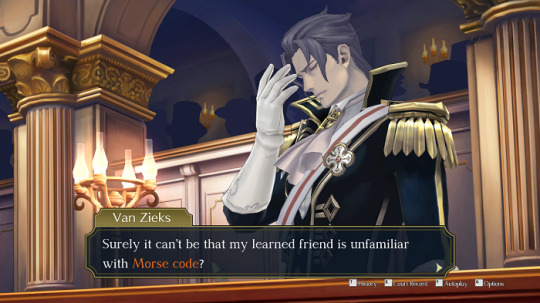
Surely it can't be that a prosecutor in an Ace Attorney game is being passive aggressive again? Anyway, turns out the music box doesn't play morse code at all because instead of dots and dashes, there's only one of the two. The testimony continues on to address that Graydon's last name used to be Milverton, a fact which causes Graydon to react very heavily and attempt to deny it. Van Zieks subtly reminds him that this effort is futile, since Graydon is a communications officer attached to civil service. His personal details would've been thoroughly checked when he was appointed to his position.

I enjoy it when Van Zieks finally gets turned around to point his sharp finger and sharp words towards people who actually deserve it. Yes, he's ferocious and a somewhat horrible person, but Graydon had this coming for being, y'know, a literal murderer who tried to frame a teenage girl. Van Zieks even reminds Graydon of the same sentiment (“it would really take no time at all for the court to subpoena those records”) later when Graydon continues to deny that Mason Milverton was his father. Good boy, Van Zieks. You're learning that not all British citizens are upstanding and it's okay to accuse some of them of wrongdoing. Because remember, in earlier trials when Ryu would indirectly accuse witnesses (or juror no 4) of lying or criminal activity, Van Zieks would overreact with an “HOW DARE YOU, SIR” of sorts. But not this time, oh no. How dared Graydon?
So with the relation between Graydon and the victim of the omnibus murder proven, we've made headway, but still not enough. So long as the music box chimes seem irrelevant, we don't have the full story to pin Graydon down for anything. For this reason, Ryu gets back on that topic and insists it's very much possible for the disc to contain secret messages. Van Zieks is still not quite convinced.

Covering his insecurities with fancy speech, I see. Van Zieks can act as smart as he wants, but the brutal truth of the matter will always be that he's not smart enough to take evidence in his own two hands and flip it over or open it up. Ryu's the only one who takes the practical approach, opens the bottom and finds out that the music box can actually play two discs at the same time. One for dots and one for dashes, which means there's a second disc out there. So with this out in the open, it's time for everyone's favorite type of Ace Attorney tennis: The back and forth truth reveal! Ryu and Van Zieks take turns in detailing the chronology of Graydon's illegal dealings with McGilded, with negotiations apparently turning sour in the omnibus two months ago, and thus the brickmaker met his end. McGilded attempted to hide the stolen disc by sticking it in his coat and pawning it at the pawnshop, but Graydon found out about this, etc. We've all played the case, we all know the story.
Graydon ultimately admits to having been at the crime scene that night, but still refuses to admit he worked with McGilded or stole government secrets. (Okay okay, ALBA, your denial is too powerful to let this game end, have it your way.) Ryu surmises that only Graydon could have shot Windibank, as he would've been the third intruder holding a third gun. Graydon flips this logic around; now that he's admitted he was at the crime scene that night, he can also admit to 'what he saw' as a 'key witness'. He claims that he saw the moment Windibank was shot by the pickpocket and he took the third gun afterwards, and he's ready to testify about it. Van Zieks, who should technically be jumping at the opportunity to hear decisive testimony for his precious guilty verdict, is instead not amused at all.

“If it is shown that your claim is false, you will have incriminated yourself as the killer.”
And these are some very telling lines once again. Why would he warn Graydon about this if he didn't have reason to believe those claims would be proven false? Why would he think Graydon could incriminate himself as the killer if he were 100% convinced that Gina is the culprit? He must know by now there's a strong chance that Gina is innocent and Graydon is the real killer. But sure enough, Graydon testifies about watching through a peephole and seeing blood spatter over the coat. Blood which he couldn't know is there unless he saw the murder happen. So the judge wonders whether the coat can be tested for blood and indeed, Van Zieks confirms that it can. A German scientist discovered that test 'very recently' and it's already being used in several courts around the globe because this test was actually, y'know, verified in the field of science.

“Ideas are no use to us here. In science, as in law, theories must be proven before they stand.” “We could shatter all vestiges of doubt within minutes!”
rip. To be clear, it doesn't seem as if Van Zieks actually knows for certain there's blood on the coat, because how could he? His insistence on the blood test doesn't seem to be motivated by hope of 'cornering Gina because the blood will definitely be there'. Rather, I think he just wants to either prove or disprove Graydon's testimony so we can all get on with our lives. Plus, I think he may want to flaunt these 'official methods' just to diss (S)Holmes's methods some more. While waiting for the results, Ryu is allowed to cross-examine the very suspicious peephole testimony. Despite Ryu being the one to press Graydon at every statement, Van Zieks will occasionally chime in with questions of his own to get some clarification. Which is funny, because the prosecution isn't the one who has to cross-examine witnesses. Van Zieks should technically be staying out of it. The fact that he's butting in to needle Graydon some more is just... I don't know, it's another one of those very telling moments, I suppose. Again, he probably already suspects that Graydon is the real killer.
The cross-examination is put on hold when the test results finally come back, confirming the blood on Gina's coat. Ryu still tries to save his case by saying the blood actually belonged to Mason Milverton, but that's obviously a very dangerous route to take.
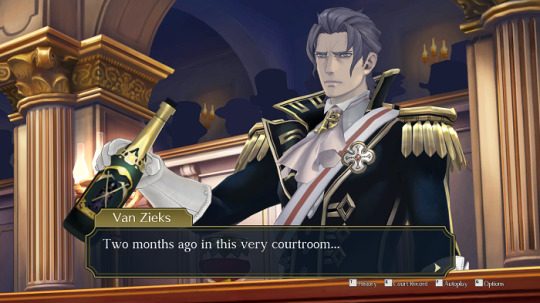
“Did you not argue fervently for McGilded's innocence? And yet now that the man is dead... You brand him as a murderer? Your conduct shatters any shred of respect you may have earnt for yourself in this country!”
We all know he was a murderer for real. Van Zieks knows this more than anyone in the courtroom (well, except maybe Graydon). Besides, Gina testified about this like fifteen minutes earlier. To be frank, the fact that Ryu is admitting to this openly should actually warrant more respect as opposed to breaking it down. Because, remember, Van Zieks gave Ryu several options two months ago to blindly defend McGilded and instead of taking those opportunities, Ryu instead admitted he couldn't say for certain whether there was foul play happening. I think what's going on here may be that Van Zieks is emotionally conflicted. He was already buying into the theory that Gina is innocent and Graydon is the real killer, but the blood on the coat threw a wrench into it all. Graydon hypothetically could only have the coat knowledge if he'd seen it happen, which makes Gina the real killer after all. With something so conclusive, any belief he might've invested into Ryu's integrity has just been 'betrayed' and indeed, if Ryu's integrity is in doubt, anything else to come from him will also be relentlessly drawn into question. That doesn't just apply to Van Zieks; all the jury members who were on Ryu's side before immediately, unanimously vote guilty. Van Zieks assumes that there will be another Summation Examination, as has become the norm.
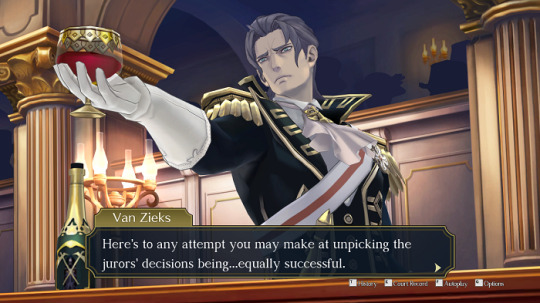
Ryu grows desperate, because changing the jury's minds is going to be exceptionally difficult now. Thankfully, our hero (S)Holmes appears! That mischievous scamp!
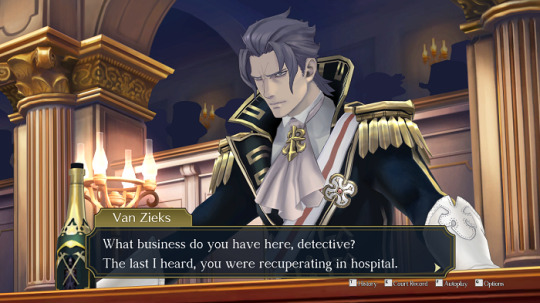
“Detective (derogatory)”. I think it would've been an interesting plotline if (S)Holmes actively investigated the Professor case back then, perhaps even at Van Zieks's request, and failed to find the killer in time to prevent Klint's death. That would explain why Barok now thinks so badly of (S)Holmes and the amazing detective he's described as in the novels. Unfortunately, the second game never really addresses whether (S)Holmes played a part in the Professor investigation and if so, why it ultimately came down Genshin's duel and Gregson forging evidence to 'close the case'. You'd think that if (S)Holmes investigated the deaths, he and his partner would've tracked down the real killer long before things could escalate that badly.
Anyway, (S)Holmes asks for five minutes of the court's time to pass some evidence on to the defense. Van Zieks begins by saying that the trial has already taken up many hours of the court's time. So 'having spent that long already...' Gregson cuts him off to agree, saying that since they've spent so long already, they don't want to waste even more time. Unfortunately for him, that's not what Van Zieks was about to say at all.
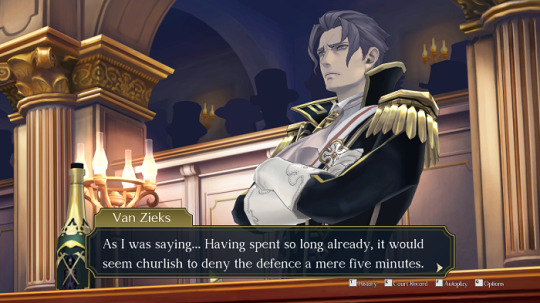
So he's fully on our side again! Hurray! All well and good, but he does still fling one of his chalices later to signify the five minutes are up. (S)Holmes thanks Van Zieks for allowing the brief recess, the reply being that he needs no thanks, since “the die is cast”. In other words, they've already reached a point of no return here. At first this seems like a very cryptic dismissal of gratitude, but what Van Zieks is actually saying is that the jurors have already made up their minds and settled on guilty. “Any attempt to alter the verdict now would be utterly futile.” Which still doesn't say much about whether Van Zieks believes they're headed in the right direction, it only says that he doesn't believe Ryu can convince them to change their minds this time.
Surprise! Ryu doesn't have to! When (S)Holmes came into the room in disguise to deliver the lab results of the coat, the cross-examination of Graydon was actually suspended. This means that, by law, Ryu has the right to continue that cross-examination instead of turning to the jurors for the Summation Examination. Van Zieks suffers through his damage animation (which has been rarely seen by this point in the game and honestly, it's a delight to watch), calling the whole matter absurd. This is the law, Ziekie boy! Deal with it! So with this final chance granted, Ryu presents the catflap device to debunk Graydon's testimony about the peephole. Susato tampered with the crime scene and made that cat flap mere minutes after Windibank was shot. So if the cat flap wasn't there before, how could Graydon possibly have witnesses what he claims to have witnessed?

Oh, he's thrown off now. He's got no idea what to believe anymore. I can't blame him; who would expect a trial to take a turn like this? We're getting close, but Van Zieks has one more obstacle to throw our way, as all prosecutors do. How can we prove that the peephole flap was made after the crime as opposed to before it? “When was the peephole cut? The prosecution demands proof of your answer!” Again, this is par for the course. This is what any prosecutor would demand. Evidence is law in Ace Attorney world and Van Zieks needs tangible proof that Ryu isn't just a 'lying traitor' like Genshin was. Naturally, we have proof and Van Zieks is the one we have to thank for that.

Considering Van Zieks is the one who showed up to court that day with a big stack of photographs from that very same 'infernal camera', this line will never stop cracking me up. So now we know for sure the peephole was made after Windibank was shot! Unfortunately, in submitting evidence we now also know one other thing.

To be fair, Susato didn't know it was a legit murder scene until the cat flap was created and they could see the body. Up until that point, it was just a scene for breaking-and-entering, along with (S)Holmes shooting. I'm sure that was taken into account when discussing the punishment later on, though. Anyway, we've proven Graydon's perjury, but Van Zieks insists we still haven't quite proven that he's a killer. Luckily, Ryu's already two steps ahead of Van Zieks here. Since we've proven that Graydon was lying about what he saw, the question is now how he knows about these things to begin with. He couldn't possibly have seen the peephole with his own eyes, so how did he know it was there? And how did he know about the blood on the coat? Gregson once again decides to interject, asking Van Zieks for 'a word, please'. He wants to leave the courtroom and return to the station to put in his report.
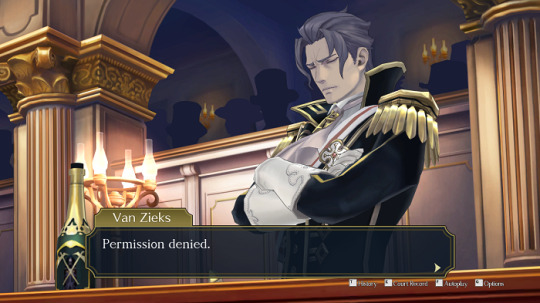
“You will remain exactly where you are until this trial concludes.”
Heeheeh. Brutal. So with Gregson forced to stay, Ryu is free to insinuate that information about the crime scene must've been leaked to Graydon. And since Graydon had no idea he'd be summoned to court to testify on the murder, he could only have received the information after arriving at the Old Bailey. The only person with the opportunity to pass that information to him (in the middle of a trial, I might add) was Gregson. Gregson immediately barks that he had no reason to leak information about the investigation to someone like Graydon, but we know that's not true. Ryu suggests there was a deal.
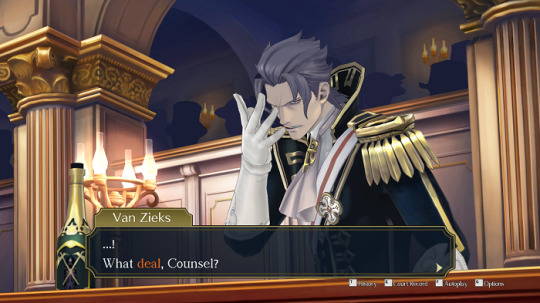
I really enjoy this particular expression on Van Zieks, and it fits especially well in this context. While he usually looks very calm and cold on the surface, he now looks outwardly ferocious, slightly unhinged. Perhaps even in pain. This is the face of betrayal and humiliation. We learn in the second game that Van Zieks had already suspected Gregson of having dirty hands when it comes to the Reaper, so I expect this insinuation hits extra hard now. It's confirming to Van Zieks that Gregson is indeed not above dirty tactics. He doesn't take it lightly, of course. “With the stakes so high, the prosecution is not prepared to listen to baseless charges. It is incumbent on the defense now to present evidence in support of this diabolical claim.”
So let's do it. It all comes down to the music box disc and the stolen government secrets, of course. Gregson admits that he was ordered to retrieve the stolen information and do it “on the q.t.” Top secret mission, this one, though earlier on it was implied to have been ordered by Stronghart. Van Zieks concludes that Gregson objected so heavily to the disc being used as evidence because he knew of the information on it. Gregson replies that he realized there was a possibility of it. Since we know the music box plays two discs, the deal must've involved this second disc. Van Zieks is now thinking ahead very quickly, here. He asserts that since Gregson is a Scotland Yard detective, he would've approached this deal with extreme caution and not simply taken Graydon's word for it. He would have asked for the article in question to be handed to him immediately and so, it stands to reason the second disc is in the courtroom at that very moment. Gregson doesn't take lightly to the accusations and when Ryu suggests a cavity- sorry, I mean body search, Gregson agrees to it without so much as a flinch. Suspicious behavior, to say the least. But this means the body search is allowed and everything rests on the outcome.

“If, following the search of the inspector's personal effects, no disk is found... You will be deemed unfit for court service, this trial will end and my country's government will formally demand of yours that you are severely reprimanded.”
But Van Zieks, if Ryu were deemed unfit for court service, who would you face in hectic turnabout trials? He's your one true nemesis now, remember? The judge agrees with Van Zieks's sentiments, but Iris has some very interesting insight: “You're just threatening Runo because you're scared!” Since Iris is one of the most clever characters in the games, we have to examine this statement further. If he's scared, then what's he scared of? My guess would be the firm, undeniable confirmation that Gregson is willing to screw with a fair trial and let a killer walk free. Yes, he was ordered to do this by his superiors (STRONGHART), but it doesn't change that Gregson is throwing an innocent girl under the omnibus to get what he wants. And again, keep this in mind, Van Zieks already held suspicions that Gregson had something to do with the Reaper curse. But they were friends once; Gregson was Klint's friend. There's a difference between suspecting an old buddy of being up to no good and hard evidence that it's true. What adds credence to this being the reason of Van Zieks's fear is one of the game's recurring themes: You mustn't look away from the truth, no matter how blinding it is. No matter how painful, it needs to be acknowledged.
So the game asks whether Ryu still insists on the search, knowing there'll be grave consequences if nothing is found. By this point I was so tired that I didn't choose any of the other options and went straight for the correct answer: Search someone else! Gregson's being so cool about it that we can already surmise he doesn't have the disc on him, but he did have the perfect opportunity to hide it on the taller Skulkin brother earlier in the trial. So Ryu insists on there being a search, and Van Zieks says:

“But your typical Nipponese stubbornness may well land you in hot water this time. Perhaps the lesson will do you some good.”
This sort of implies to me that Van Zieks has also realized the disc isn't on Gregson's person. He's known the guy for a very long time, and so, he'd also know that Gregson is easily flustered with zero poker face skills. There's no way he could look so cool if there was a chance of the disc being found in his pocket. So this is the point where Ryu reveals that he doesn't want the search done on Gregson, which does succeed in ruffling our dear old inspector. Gregson starts accusing Ryu of having lost his mind and the court shouldn't have to put up with this nonsense, with the gallery also erupting into chatter. Iris snaps and tells everyone to be quiet. Ryu's just doing what he was told to do and having the courage of his convictions, so they should all respect that and listen to what he has to say. The judge admits that the court is in awe of the defense's convictions and I could write an entirely different essay here about Ryunosuke's growth throughout the games, but I won't. Point is, the cavity- sorry, I mean body search of Nash Skulkin is allowed. Gregson absolutey has zero poker face without a doubt, as he tries to object to the search in the name of Scotland Yard.
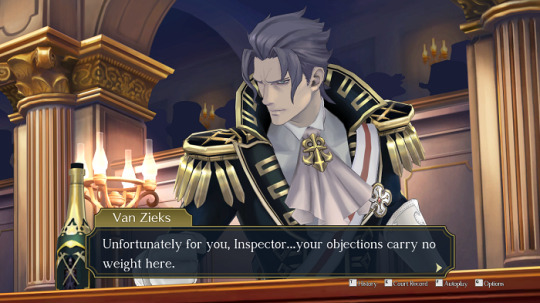
“In this courtroom, only the prosecution and the defence have the authority to object.”
Gregson tries to sputter his way out of this, but Van Zieks says: “I have no idea what forces are in play that might influence your actions, but personally I have no intention of obstructing the course of this trial.” (Gregson literally said that Van Zieks needed “Stronghart's paw print” to get more details on the top-secret investigation into McGilded's shady activities, but sure. No idea what forces are in play. Okay.)
Pin 'im down and use the rubber glove, bailiff! The missing second music box disc is pulled out of Nash's jacket and Ryu explains why he knew it'd be found there.

Uhhhhhhhhhh. I think what Ryu's trying to say is that Gregson would rarely fly into such a rage that he'd assault someone physically, but... This man absolutely loses his composure all the dang time. Just ask the fish n chips he keeps aggressively chomping down or scattering over his shoulder. He doesn't strike me as a composed character at all, so to say he behaved “extremely out of character” is kind of off to me. But whatever, it proved our point so I'll let it slide. When the judge asks why Gregson didn't just submit the second disc as evidence the second he got his hands on it, Van Zieks surmises that if the information on the disc were revealed in court, it'd be problematic. Gregson once again confirms he's working under direct orders from the ministry (STRONGHART) to keep the stolen info on the down low. But now we've got a problem. Neither Graydon nor Gregson will admit that they made a deal for the disc (it just magically appeared in Gregson's possession then, sure) and so long as they don't admit to that deal, we still can't prove Graydon lied about his testimony in regards to Gina being the shooter. The judge is ready to turn the matter over to the jury for their final learnings, and if these people had any common sense they'd all vote not-guilty because Graydon is getting away with his nonsense through a sheer technicality. Even so, Ryu intends to put the squeeze on Gregson by playing the second disc along with the first to determine whether there's truly morse code involved. Either Gregson admits to unlawful dealings with a witness to protect state secrets, or those state secrets get played out loud for everyone to hear. Gregson warns him he'll be making an enemy of the entire British government if he lets those secrets out into the world. Ryu insists he'll stop at nothing to do his job and protect his client, no matter who he makes an enemy out of. Van Zieks pours himself another glass of wine in silence.

Yeah, a real shrewd, calculating man. Uhuh. Again, I want to take a second here to point to the symbiosis we usually have between prosecutor and lead detective. Even in the case of Fulbright and Blackquill, with their unique circumstances, they still worked in tandem. You'd never catch them bickering about whether or not to present a certain piece of evidence. It's fascinating to watch Van Zieks consistently ignore Gregson's pleas. Speaking of which, let's have a leg slam to shut Gregson up.
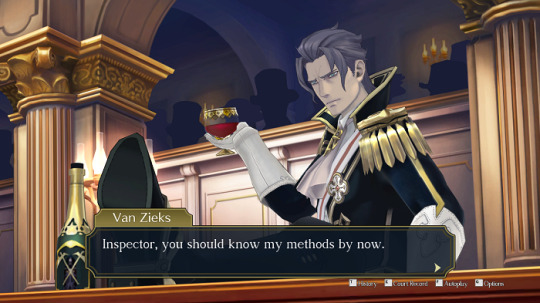
“I'm a prosecutor. ...I'm no Scotland Yard puppet. In this courtroom, my duty is to the law. So let me propose a toast. To uncovering the truth... by fair means or foul.”
YOOO!!! Get him, Zieks! There's absolutely no denying now that Van Zieks is 100% on Ryu's side. He knows that playing the secret message will cause Gregson to cave and admit to his shady deal. And once we know for certain Graydon's testimony is one huge sham... Well, as Van Zieks already said earlier, Graydon will be incriminated as the real killer.
So the box plays for about ten seconds with actual morse code this time and Gregson cracks like cheap porcelain. When Ryu confronts him with how this dealing would lead to the defendant being wrongfully accused of murder, Gregson just kind of shrugs it off. On its own, you might be thinking Gregson is a scummy asshole for this, but there's some very important factors to keep in mind here from the second game. First of all, very simply, Stronghart ordered Gregson to retrieve the info 'no matter what' and Gregson isn't in any position to refuse at this point. But then there's the Reaper's curse, which is way more important. Even if Gina were found not guilty, she'd still have to die. Not just die; Gregson would have to arrange for her death. I doubt he enjoys being in that position, so it's easier for him to just willfully sabotage the trial and have Gina be executed by the government. Some of the blood would still be on his hands, but at least he wouldn't have had to orchestrate some elaborate death trap himself, leading to all the blood on his hands. (Cool justification, still second-hand murder.)
Uh, wait, this is a Van Zieks essay, not a Gregson essay. So anyway, after Gregson gets choked by Graydon and nobody steps in to help him, we finally get the truth, the whole truth and nothing but the truth. Graydon has a semi tragic backstory and he was the one who cause the omnibus fire.
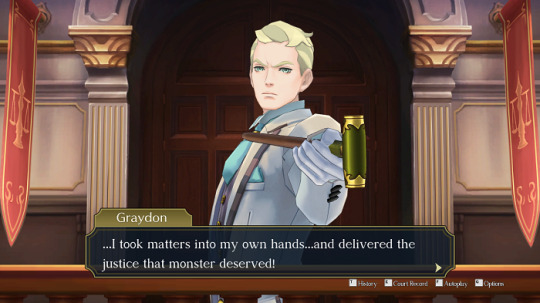
I guess Graydon wasn't too familiar with the Reaper's curse. Either that, or he didn't believe it was real. So now, to reiterate, we're told several times that anyone prosecuted by Van Zieks is doomed, but only one of the defendants Ryu's had so far has died a tragic death and it wasn't even because of the Reaper's curse. It was because someone else sought revenge, so even if Van Zieks hadn't been the prosecutor, McGilded still would've died. Graydon then goes on to talk about what happened in the pawnbrokery and how he shot Windibank without even thinking about it. Van Zieks has something to say about this.

“A man who used his wealth and influence to distort the facts and escape justice for the crime of murder. What tragic irony... For what you have done... is exactly the same. You've become the very monster you saw, and despised so deeply, in McGilded.”
I feel like this is even more elaborate setup to the fact that Van Zieks's brother, a wealthy and influential man, was actually a mass murderer. For bonus points: 'someone realized the wealthy man was a murderer, knew he wouldn't be confronted with his crimes and therefore took matters into his own hands with vigilante justice'. Does that sound familiar too? Gosh, I love foreshadowing. The judge tells Gregson he'll have to face charges as well, with Van Zieks chiming in that even if it was in the line of duty, Gregson's crime is a serious and inexcusable one. With that, the attention is turned to the defense. The judge says that the morse code thing was an unexpected revelation (and this is said in a complimenting sort of way), with Van Zieks unable to stay silent on this:

“In fact, I think we should applaud my learned friend's courage here today. I propose a toast. To demanding that government secrets be disseminated before the entire courtroom!”
Hee hee... Well, Gregson did warn him beforehand that he'd be making an enemy of the British government if he played those music discs. Ryu becomes very flustered and apologizes, but the telegraph juror interjects here to say that the dots and dashes weren't really morse code. Rather, it was just gibberish to her. So despite Iris looking thoughtful, it seems we didn't spill any beans after all and the matter is dropped. We move on to our verdict, a unanimous not-guilty for Gina Lestrade. Hurray!
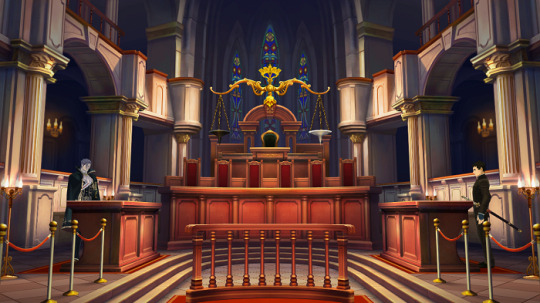
Now there's a very clumsy scene transition of Ryu and Van Zieks standing in the abandoned courtroom, facing one another. I suppose Van Zieks made some sort of gesture for Ryu to hang back so they could speak in private? It's odd for them to still be standing behind their respective benches, though. Since court's dismissed, it'd be easy for them to just walk up to one another instead of shouting across an empty room. It may be symbolism that there's still a gaping void between the two of them; the Professor incident. Or maybe I'm giving the game too much credit there and they just couldn't be bothered to animate new backgrounds for this single scene. So here we have a very important conversation. I'll type it out:
“I must say you've surprised me, my Far Eastern friend. Despite being a Nipponese, you saw through the pretence to the malice that festered within that Englishman. And at the same time, you saw through the grime to the surprising heart of your English client. You have a curious talent for judging character, especially considering our very different cultures.”
So here we have a telltale problem with racial prejudice. Van Zieks assumed that because Ryu has a different background, especially culturally, he wouldn't be able to understand or relate to English citizens. We've seen this sentiment before in case 1-4, where Van Zieks is shocked that Ryu would understand the mind of an English policeman. Ryu says that he doesn't think there's anything curious about it at all, because whether people are from Britain or from Japan, they're all human beings. They're not so different on the inside. Ryu is effectively saying that Van Zieks needs to stop categorizing people based on their nationality because that doesn't work. Human beings are human beings; some of them are good and some of them are bad. Van Zieks doesn't directly reply to this, instead confirming what we already suspected.
“You know, I took this case for one very simple reason. To lock swords with you once again here in the courtroom. When I encountered you for the first time two months ago, it reminded me... of toasting friendship and trust with another Nipponese... only to find my trust betrayed. Through you, I hoped to look into the eyes of the man I once knew... and try to understand.”
So remember in the previous essay when I surmised that the torrid look of hatred in Van Zieks's eyes was directed at someone who died ten years ago? Well, it's confirmed here. Van Zieks didn't see a fresh newbie whenever he looked at Ryu; he saw Genshin Asogi. The betrayal which took place ten years ago was never given closure. Sure, Van Zieks managed to send Asogi to the gallows to exact 'justice' and get some form of payback, but he was never given Asogi's motives. He never got to confront this man with the emotional turmoil or the hurt, because he wouldn't have been given the opportunity to do so and even if he'd tried, he wouldn't have gotten satisfactory responses. Asogi was abruptly executed and Van Zieks never learned just what possessed a dear friend to murder his brother. He was left with boiling hatred, grief and a whole lot of questions. So indeed, now he hoped to 'understand' Asogi through Ryu, but that was never an option to begin with. Ryu has no relation to that man, so Van Zieks might as well have tried to grasp that understanding by 'locking swords' with Beppo. It's about the same level of futility. Van Zieks's misguided attacks appear to be born from the assumption that it must've been a cultural thing; that perhaps betrayal is something which comes naturally to people from Japan. It's an incredibly stupid, naive way of thinking, because by simplifying Genshin's motives down to his race and cultural upbringing, it takes away the option that there's a far darker truth to be found. Quite frankly, I think Van Zieks is afraid of that truth, just as he was afraid of confirmation that Gregson's not above dirtying his hands. To affirm that Genshin Asogi's friendship was genuine and he truly was an honorable man would imply that he'd had a reason to take Klint's life. I'm not saying it was a good reason! I'm just saying... a reason. When Ryu asks for more details on what happened back then, Van Zieks won't reply.
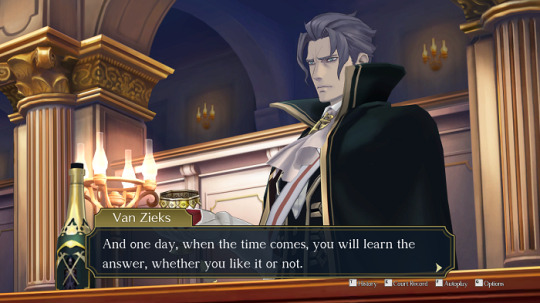
“Coming to be known as the Reaper of the Bailey, and my retirement from service five years ago... It gives me cause to wonder if our meeting has some deeper purpose. So... Farewell, my learned Nipponese fellow. Until we meet again.”
(He crushes another chalice in the process of saying this, because of course.) The deeper purpose alluded to here, along with the earlier line that Ryu may one day learn the answer, can only mean that Van Zieks foresees something of a journey here. A path to walk down together with Ryu in which, eventually, the Professor case will once again surface. Whether that's a good thing or a bad thing for Van Zieks, we don't know. I'm not sure he knows. But he did admit to having been pleasantly surprised by Ryu and he had a civil conversation with him just now, so the sentiment here is that Van Zieks is slowly letting go of some of his earlier grudges. He doesn't outright admit that he was wrong to be a scumbag to Ryu, nor does he apologize, but by admitting he was only attacking Ryu to make sense of something that happened in his past, he's basically admitting to his behavior being irrational. He's softened up a little, and with a second game on the way, it means at the very least the option of further character development is there.
The conversation ends and in the defendant lobby, Gina is reminded she's not in the clear yet. There's the curse, after all. Gina's not afraid, because he say she sees it, “the Reaper is a bit like Him upstairs.” Sort of funny to equate the Reaper to God, but what she's basically talking about is karmic retribution. Rotten coves like McGilded get what's coming to them, but she knows she's a good person deep down and so, she thinks she'll escape the curse just fine. Which doesn't say much about all those other victims who came before McGilded, mind. We can't say for certain they were all rotten too. Well, the second game will tell us whether she escapes with her life or not. And normally I would also take a look at the little 'bit' that characters have in the end credits, but Van Zieks didn't get his own bit for whatever reason. He's only briefly mentioned by Pat and Roly Beate, so that's it when it comes to his character in the first game.
Next up, we're moving on to case three of the second game, taking place six months after The Unspeakable Story!
#dgs#dgs spoilers#tgaa#tgaa spoilers#barok van zieks#hot dang#this trial escalated quickly#I took like 500 screencaps when Graydon went for Gregson's throat
17 notes
·
View notes
Link
Part III of my series about the changing face of L.A. Click for Parts I and II.
I ended Part II with a look at how L.A. County’s Hispanics are habitual nonvoters. Let’s pick up seamlessly from there, in Compton. Compton used to be so black (over 85%) that at my high school we had a litany of “Compton so black” jokes.
…
Today, the birthplace of “gangsta rap” be not black at all. At last count (prior to the 2020 census), it was 68% Hispanic and 27% black, and I’d bet my house that the new figures will show that the Hispanic number has risen beyond 70% and the black has dropped below 25%.
Compton so Mexican its city hall’s a Home Depot parking lot.
Now dig this: In a city that’s roughly one-quarter black and almost three-quarters Mexican, of the eight elected officials (mayor, city attorney, city clerk, treasurer, and four councilpeople), only one is Hispanic. All the rest are black. And it gets better. That one Hispanic councilman won his election by just one vote, and our Soros-backed DA is prosecuting the guy for fabricating the one vote that put him over the top. Turns out the bean only ran because a black guy who’d lost his primary made a deal with him to run in his stead in exchange for giving the failed black candidate a lucrative city commissioner position if he won, and together they faked the winning vote.
Can you wrap your brain around that? The city is 70% Hispanic, and the only Hispanic council member, who only ran because a black dude made him, won by just one vote, and that vote had to be faked.
Get my point now about Hispanics not voting?
I mean, imagine a city that’s 70% black, but only one out of eight city officials is black. And then the county DA tries to nullify the vote that got that one black elected. There’d be riots! Neighborhoods would be burned to ash. Don Lemon would be screaming about “equity,” and the Biden Justice Department would be investigating the DA.
But Mexicans don’t care. They’re fine with letting the black minority pretend to be da Emperor Jones. That’s how little participatory democracy matters to them. And Dems have no desire to “enfranchise” Compton Mexicans because blacks are their most reliable and manipulatable minions. Never trade a slave for an independent contractor. Plus, as I discussed last week, when Mexicans do vote, it’s all over the map. As Newsweek contributor Richard Hanania pointed out regarding polls that show California Hispanics divided 50/50 on the Newsom recall (blacks are 65/35 against it), “I feel like it’s fun living in a state with many Mexicans because you get a wildcard aspect to politics. Keeps things exciting.”
…
So what we know is that Mexi voting ambivalence is resilient. Would it be equally resilient to rightist coercion? Who knows; no rightists out here are testing the waters. The Hispanic rejection of affirmative action was due in large part to a general dislike of blacks. And in February when the black- and Jew-run L.A. school board defunded all campus police and redirected the $25 million LAUSD security budget to a program to fund the education of only black students, the discontent among L.A. Hispanics was palpable. Blacks make up barely 8% of LAUSD students (Hispanics comprise over 70%). Hispanic Twitter exploded with fury over the “black-only” payday coming at the expense of campus security, and the L.A. Times was forced to admit that Hispanic support for campus cops was massive, especially compared with support from non-Hispanic whites (a whopping 67% to 54%).
So did our local “Republicans” try to make hay out of that? Of course not, because to do so would risk offending blacks, and the GOP establishment has sworn a blood oath that it shall never allow itself any forward motion that might jeopardize its (zero) chance of “winning the black vote.”
There could literally be one black man left in L.A., and the GOP would sacrifice everything for his favor.
…
So, our Mexicans are untested, and our rapidly decreasing blacks, our gradually increasing Asians, and our moneyed and influential secular Jews are a lost cause. What about our non-Jewish non-Hispanic whites?
Ay yi yi, they’re the woist of all. The leftist ones represent the bottom of the barrel of self-hating “please genocide me before I enslave again,” “I hope my son goes tranny so that my foul DNA might dead-end with my progeny’s amputated penis” wastes of space. The mostly non-Jewish white upscale deep-blue city of Manhattan Beach, for example, is filled with self-flagellating WASPs who spend their time trying to make their safe city less safe by “giving land back” to blacks who were supposedly racisted out of town in the 1920s.
And now Manhattan Beach is regularly visited by black criminals, from serial rapists to boardwalk thieves to a home-invasion attempted murder just a week ago. I’m sure the guilt-ridden Robin DiAngelos of Manhattan Beach excuse these crimes as justified reparations owed to noble negroes.
…
Worse still, our “rightist” whites—those who choose to be activists—are just plain batshit crazy. Our MAGAs are violent, self-destructive, foolish, and dim-witted (I’ve covered this before, and I’ll be revisiting it next week in a column that’ll post on the eve of the gubernatorial recall).
…
In largely red Beverly Hills (and surrounding Westside areas), the Persian, Israeli, and Orthodox Jews, who are not suicidal, are holding the line against the violent crime and property crime that still disproportionately come from blacks (ironically, as the county’s black community shrinks, the thugs are forced to venture beyond their comfort zone in search of victims, rather like how bears become more bold as their natural habitat shrinks). But what of the areas that are largely Hispanic? Well, our Hispanics (as the Times pointed out) have a more positive view of police than our whites. That’s something often overlooked by those who claim to study criminality in racial or ethnic groups. It’s never just about criminality; it’s also about acceptance of policing. Whites who dismantle the criminal justice apparatus are as much to blame for rampant criminality as low-IQ thugs. Portland is an example of how poisonous such whites can be; violent crime in that city isn’t the result of a huge population of blacks but a huge population of self-hating anti-cop whites.
…
Our Hispanics occupy a middle ground: between black and white on the criminality scale (not as high as the former, not as low as the latter), but better than both groups on acceptance of policing. Half of L.A.’s cops and sheriff’s deputies are Hispanic, and our sheriff, Alex Villanueva—an unapologetic kick-ass crime fighter—survived the George Floyd purge last summer because his fellow Hispanics backed him against the blacks and whites who sought his ouster.
A county can weather criminality if it allows rigorous enforcement. L.A. had a lower murder rate than it does today back when there were more blacks but also more enforcement. Now that blacks, leftist whites, and secular Jews have decided that enforcement equals genocide, the last hope for the county lies with the Westside Persian/Israeli/Orthodox Jews and the Eastside beans.
There’s a logic to this, as those groups mingle more than you might think. Be it as nannies, gardeners, construction workers, warehouse personnel, or restaurant staff, the Westside is where many Mexicans go to work every day.
As one of those Westside Jews (though an outlier, as I’m “red” without being Persian, Israeli, or Orthodox), I would absolutely throw in with the beans as opposed to the leftist whites or the MAGA whites. Both groups, like blacks, have become suicidal. And suicidal people are dangerous.
Yes, Mexis have gangs, and you don’t want to walk down certain Eastside streets at night. Big shit; no one has reason to except those who live there. In the 1970s those areas were worse when they were black.
But Mexicans do the scut work around here, they don’t riot when one of their own is arrested (indeed they arrest their own), and they aren’t dangerously self-destructive.
I’ll take it.
Not that I have a choice; it’s the way it’s gonna be, demographically, whether I like it or not.
But it’s not the worst-case scenario, or even the second-to-worst. And these days that’s good enough.
1 note
·
View note
Text
Imagining the end of capitalism

My latest column for Locus Magazine is “The Unimaginable,” about the relationship of science fiction plays to the future. Sf is a literature of inspiration and warning, not prediction.
https://locusmag.com/2021/11/cory-doctorow-the-unimaginable/
I mean, thank goodness. If the future was predictable, there’d be no point in getting out of bed, because the future would arrive irrespective of our actions. Sfnal tales that posit a predictable future (like Asimov’s “Foundation” or Heinlein’s “Jonathan Hoag”) are pure fatalism.
Instead of predicting a future, sf imagines lots of futures. This is an intrinsically political act, because it rejects the political claim that the world is the way it is because it could not possibly be different. This claim is often implicit in ideology, but Margaret Thatcher made it explicit, claiming “there is no alternative” to free-for-all capitalism. This idea — shortened to “TINA” — is the cornerstone of capitalist realism, whose goal is to foster a mindset where “It is easier to imagine an end to the world than an end to capitalism.”
Now, this is obviously untrue. It’s super-easy to imagine a world without capitalism. My own books — Down and Out in the Magic Kingdom, Walkaway and more — have done so. The very exercise of imagining a postcapitalist world is heady and refreshing.
But while postcapitalist futures are a dime a dozen in sf, the actual moment in which capitalism ends is rarely depicted. For example, Kim Stanley Robinson has published a string of astoundingly great novels depicting postcapitalism (Pacific Edge, 2312, etc), without giving us the transition itself.
Or rather, he hadn’t given it to us, not until 2020, when he published his blockbuster climate novel “The Ministry for the Future.”
https://pluralistic.net/2020/12/03/ministry-for-the-future/#ksr
“Ministry” breaks new ground for Robinson and does something rarely seen in the field: depicts a plausible, step-by-step sequence in which capitalism falls. To make this work, Robinson employs a documentary storytelling style, where short vignettes depict key moments through the eyes of dozens of characters. This in-the-round view of a complex and wrenching change is so damned hopeful — a tonic against the dystopian fatalism all around us.
But as I wrote with in initial review of Ministry, I think Robinson’s book has an important omission. The transition from capitalism to postcapitalism that it depicts involves multiple acts of spectacular, ghastly violence. For example, one key turning point comes when every private jet in the sky is destroyed midflight by a coordinated drone-attack.
This event is depicted through a news-story-like exposition — the documentarian’s camera does not switch on in the cabin of any of those jets, nor in the lair of the terrorists who caused them to fall.
I think I understand why Robinson made this choice. He’s trying to split a very fine hair: the injustice and death of unchecked climate change will make people angry enough to murder, and the people who have it in their power to avert climate catastrophe might be motivated by the fear of that anger. I don’t think he’s glorifying the violence, nor apologizing for it, but rather, depicting it as a kind of inevitable outflow from abandoning billions to suffer and die in order to preserve profits for a tiny elite.
Even for a writer of Robinson’s prodigious talents, giving us the worm’s eye view of the terrorists and their dead is hard going. You don’t want to glorify the violence, and you don’t want to transform the martyrdom of their victims into redemption for their decades of genocidal greed.
Margaret Thatcher is the opposite of science fiction: TINA is a demand to stop trying to imagine an alternative. By contrast, thinkers like David Bollier advance TAPAS, which stands for “There are Plenty of Alternatives!”
https://www.thealternative.org.uk/dailyalternative/2020/5/30/tina-tacos-commons-bubblng-up
As Michael Hudson writes for Naked Capitalism, TINA’s appeal is in its ability to offer a deceptive “proof” that markets produce the best of all possible worlds:
https://www.nakedcapitalism.com/2021/11/neoclassical-economics-is-dead-what-comes-next.html
For decades, capitalist realism has attempted to extinguish our very ability to imagine alternatives. Hudson says that the thing that comes after capitalist realism isn’t another ideology with pretenses to empirical capital-T truth. Rather, we’re heading to a world based on “a variety of useful alternative views on economic policies and practices.”
Robinson’s decision to draw a veil over the spectacular violence in his transition isn’t a flaw, but rather, a residue — the last remnant of our TINA-stunted imaginations. It points the way for future work, where writers lean hard into this question.
The more ways we imagine a transition, the more hope we bring into the world. The very fact that a transition is possible is a reason to attempt it.
40 notes
·
View notes
Text
My take on feminine enbodyment and female empowerment
This concept of modern feminism and pushing men out of the picture affects me differently than the average woman, because I was raised without a dad. When my mom adopted me and my other siblings, she never got married and instead asked her best female friend to step in and help raise all four of us. I was very loved, but I felt that absence of a father all my life. It affected nearly every part of my childhood and teenage years, and it continues to affect my adult life. I wanted to get a boyfriend and eventually get married, but the only constant guy in my life was my older brother. Therefore, I had very few examples of what respectful, good, masculine men looked like.
When I was a sophomore in college, my roommate at the time showed me a YouTube channel called Blimey Cow, and they had made a video called “Ten Ways to get the Right Guy to like You.” I hadn’t thought about this video or this channel in a few years, because they primarily make Christian content. I’m not a Christian anymore, nor do I agree with all the beliefs of Christianity. However, I decided to go back to this video two days ago, because I remembered how these creators directly challenged how our culture defines female empowerment. Specifically they used this video to present that challenge, with an emphasis on noting the difference between female liberation and female objectification. Some of the suggestions they made to help girls find the right guys included showing interest in their hobbies, supporting their local chivalry, letting the guys in their lives know they appreciate them, putting less emphasis on how much skin they show and more emphasis on who they are as a person. As a 20 year old college kid, these young content creators made a bigger impact on my views on men, women and the hyper-sexual movement than I would have thought. As a result, their video gave me the nudge to dive deeper into this topic through writing.
When you first learn of the term “female empowerment”, it sounds attractive enough: women being seen as a force to be reckoned with, authoritative, strong leaders who are goddesses in nearly every way. Rather than being stuck at home to take care of the kids, women are encouraged to pursue their career dreams, step into more masculine leadership roles and “be the boss”, for lack of a better term. It all sounds appealing until you start to dig deeper into what’s behind the phrase “female empowerment.” One big part of how I discovered this occurred last summer.
In July of 2020, I chose to invest a serious amount of money to an online holistic sex course. It was called Well-F*cked Woman, created by a woman named Kim Anami. Through using the tools learned through this six week course, Kim claims to have helped thousands of people all over the world, especially women, to connect with the untapped power of their sexual energy. She believes that a big reason why people are as stressed, unhealthy and unhappy as they are is because they’re not having the right kind of sex. Moreover, they’re not having the right kind of sex often enough. Whether you’re in a couple or single makes no difference. If you want to gain body confidence, get orgasms or even heal ancestral trauma, Kim claims this course would teach you how to obtain all those things by utilizing your sexual energy.
When I read the information on it, I became very intrigued. After several days of listening to her podcasts and reading her blogs, I became more convinced that this course could be a big help for my personal well-being. At the time, my goal was to use the course to heal some of the imbalanced sacral energy I still had. Hopefully, it could even heal some ancestral wounds I carried in my DNA. If I achieved that, finding a romantic partner would be more of a bonus than a direct goal. So when I received the stimulus check from the government, I used that money to pay for the course and one of Kim’s jade yoni eggs.
For each of the six weeks, we would get a video with a written syllabus to discuss different topics, most of which revolved around sex. One week we would focus on self-love practices, one week we would talk about the relationship between sex and money, another week we learned about food, etc. In that first week, I began the exercises easily enough. However, I also started to feel very conflicted about the information we received in this course. For example, in the syllabus about self-love, one of the first statements Kim made about women is that “most have rape fantasies.” Admittedly, I didn’t really understand what that meant or what it was, until a friend told me. Once I did understand it, it bothered me deeply, to say the least. As someone who claimed that her work helped heal women’s sexual trauma, to hear Kim make such a statement right off the bat made me feel uneasy.
In a separate journal, I had written down my progress of the course and some of the conclusions I had made about what it taught and about the woman who taught it. In one entry, I had observed that it seemed to take a lot of money to become a “well-f*cked woman”, by Kim’s standards. If needed, it could possibly add up to hundreds, if not thousands, of dollars. For instance, if you wanted to use a jade egg as a sexual healing tool, that cost $300. The six week course itself cost almost $1000. Kim also recommended using therapy injections to change your neural pathways, if you were a victim of sexual trauma. Just getting one injection is expensive enough, but if you “need” more than one injection or appointment, that will add up fast. Sadly, such treatments are not easily accessible to everyone who wants sexual healing. It certainly wasn’t for me.
Additionally, a recurring message that came up in the course was that it’s important for couples to have sex more than once a week. In this case, it wasn’t talking about the faster paced sex described as being numb and fleeting. On the contrary, Kim wanted us to aim for the slower, orgasmic, breath focused sex where you’re working to maintain and build up a flow of sexual energy. While in some ways, this course educated people on sex differently than our modern culture, some aspects seem pretty similar to me. For example, one night stands are still seen as acceptable situations to practice generating this energy. We were encouraged to practice sex acts two to three times a week, to the point of becoming sex addicts. Also, even though Kim frowned upon pornography, we were still taught to utilize BDSM as a way to create polarity in our relationships. This was to make sure that “spark of passion” was maintained for the long term. Lastly, Kim would sometimes demonstrate problematic double standards when it came to showing examples of how to respect your partner. In one of her stories about “helping” her partner become confident with himself, she talked about making a point to touch his private parts in public, whether he was okay with it or not. If not, she claimed “it was his problem.” In my opinion, if they’re genders had been switched, she would have been called out for her disrespectful behavior immediately among the group.
In this class, Kim discouraged us from using substances like alcohol and drugs during the practice, because of how they damage the body. On the other hand, she promoted addictions to sex as something positive, as something to attain for as a human being. Whether you are in a couple doing the act or you’re a single adult who’s just masturbating, you were encouraged to have some kind of sex several times a week. According to Kim, it needed to get to the point where you felt you couldn’t go about your day without generating this energy. “What an addiction does is that it causes you to stop thinking,” says Michael Knowles, who was a guest on the Candace Owens Show discussing modern feminism. “It enslaves you. It makes you prone to certain behavior, and when you’re not thinking, that’s when the people who want to grab power can come in and force it on you.” Too much of anything can be detrimental for your well-being, on all levels. During a time where protection of boundaries for my spiritual life had become very important, this way of thinking pushed me to discover what kind of boundaries I had and to stick to them. In this case, it lead me to the conclusion that if being like Kim meant being addicted to sex, disrespecting the men I care about, and using methods of sexual control for the sake of “polarity”, then I would rather not be like her at all.
With all that being said, I believe the big question is this: how exactly does the WAP culture of free sex and female empowerment differ from the holistic sex culture I learned about in the summer of 2020? How does our pop culture differ from the Well-F*cked Woman course, in how we’re being educated about sex? In my opinion, one culture pushes the more superficial, fleeting benefits of sex in our faces, while the other pushes for using sex and sexual energy as a way to harness untapped power. This power can, supposedly, be used to energize us, heal our bodies, and manifest things into our lives. Regardless, both cultures seem to be more concerned with using sex to gain power than using it as a means to express true love. Both cultures seem to encourage women to “embrace their femininity” by leaving their underwear off more often. Both cultures seem to promote double standards on how partners should respect each other and their boundaries. Both cultures still push us to become addicted to sex in order to have a fulfilled, happier life, because according to them, every aspect of our lives will disintegrate without it.
As a result of the lockdown, last year turned out to be most isolating time for us, and it was intense enough to put many people into a deep state of depression. At a time when everyone is stuck online and forced to keep further apart, this is when people in the online sex business—holistic or otherwise—will benefit the most from that loneliness. They can use it to make those profits and fill their own pockets. This becomes more obvious when you observe their marketing tactics, including the ones I noticed for Kim Anami’s website: unless you give me your money and do what I tell you to do, you will never be “well-f*cked.” Everything in your life will deteriorate unless you become “well-f*cked.” You will be a brainwashed zombie forever, easily manipulated, unless you become “well-f*cked.”As my friend Lee Yun would say, “These tactics are designed to create an empty void in people that can’t be filled.” In the cases of some individuals, even if they were to try, it would cost them more time, money and energy than they were lead to believe.
For those of you who wonder if I still keep up with the practices I learned from this course, I haven’t. At least, I haven’t kept up to the degree that would be necessary. My jade egg is sitting on my altar collecting dust, even as I write this. Because of the amount of money I spent to buy the egg, this is not something I’m proud to admit. A jade egg is a sacred, special tool that deserves to be put to use for the highest good, and eventually, I will find a teacher that can help me do so. I just don’t want to have to conform to this holistic “WAP” standard to get there.
Surprisingly, by reflecting on my past through watching Blimey Cow’s videos, I realized there are still some values about sex, intimacy and femininity that I learned as a teenage Christian that matter to me now as an adult witch. In my opinion, sex is something very sacred that should not be taken so lightly, because of how it connects you to your partner in an intense, physical and spiritual way. For me, I take it seriously enough to still choose to wait until I get a husband and to choose not to masturbate. Additionally, when I do have sex with my lifelong partner, it will be as much about him as it will be about me. This means respecting and honoring him as a man as well as I know how. In my opinion, if you encourage people to use something like sex to attain higher spiritual goals, but neglect to show basic respect to your partner’s boundaries about his body, then in the words of Jordan Taylor from Blimey Cow, “you’re doing it wrong.”
Michael Knowles interview with Candace Owens on the Candace Owens Show: https://www.youtube.com/watch?v=ejWIEMs8ecg
Blimey Cow’s YouTube video, “Ten Ways to Get the Right Guy to Like You”: https://www.youtube.com/watch?v=iqF_PtugyBk
#blimeycow femaleempowerment feminineembodiment jordantaylor candaceowensshow michaelknowles#the daily wire#holisticsex#menmatter
2 notes
·
View notes
Text
FALSE PARADIGMS AND HEALTH
The approach of science that ignores the spiritual living aspect of the universe and which has tried to reduce science to a rigid model of numbers devoid of soul has been disastrous in many ways for humanity. The failure to understand that it is souls which are logically the one and only things that create energy in the fabric led to over 100 years of increasing nonsensical theories. This in turn saw physicists become more insecure and confused and in their efforts to appear credible held ever more tightly onto failed models and aggressively suppressed anything that rocked their flimsy world views. The modern religion of physics dogma promoted as scientific fact that has arisen from half baked Theories has been popularised by the rise in atheism which goes against every instinct of man. It has also added to the tearing apart of the fabric of society by descent into immorality in all sorts of subtle and blatant ways. That immorality often justified by popular opinion, the ability to persuade people by the use of arguments that often confuse people by inter changing and misrepresenting science with opinion. Often propagated by creating economic and demographic inequality which leaves the most vulnerable people victims of poverty, lack of education and easy prey for those with evil intent.
In terms of physical health the planet has in some senses advanced using the principle of one step forward and two steps back. Every advance in technology since the industrial revolution has had the potential to improve the lives of everyone on the planet but the economic inequality it has created has meant many people in developing countries now live in conditions worse than their ancestors of 100 years ago. Millions still live in sub saharan Africa for example with no access to clean water, education or electricity. 100 years ago most villages had wells and fruit orchards full of mango, papaya, oranges etc but now many have cut down those trees for cash crops and animals leaving no water in the wells and a meagre supply of free food for everyone to enjoy when the fruit ripens. Some of the slums people are forced to live in have conditions worse than the conditions in large cities like London or Paris 150 years ago. In Kibera a slum in Nairobi, Kenya for example people are forced to live in ditches and corners under corrugated iron beside open sewers and pay organised criminals rent in order to hold onto that very last sense of stability. Even in slums like Kibera I found the spirit of love, gentleness and faith phenomenal, the kindness and tolerance as strong and as powerful as the resolve to keep going. I imagine the immense temptation to vent their frustration and anger against a light skinned person who to their eyes probably lives in a modern home and has unlimited wealth must have been immense but while aware of that sense constantly I rarely felt in danger, peoples openess and kindness of spirit were heart warming, that spirit only occasionally interspersed by an occasional drunk who tried to seize me and vent his anger. It seems to me it is those who are most in pain, poverty, suffering the most understand the power of love most instictively. They keep moving, they hug, play, laugh, talk louder, faster and harder than anyone else, they create energy and they have little time for wasting on negativity or anything that will get in the way of the flow of positive energy. They exercise great patience and tolerance which in itself creates a vibration that silently gives strength to each and all.
Recently the reaction to the Covid flu demonstrated a complete lack of understanding of the power of love and what was effectively a routine flu going around became a hysterical descent into chaos. Yes it is a very infectious flu but statistically a very weak one. All flus tend to kill a certain number of the most weak and vulnerable. As mentioned elsewhere in this paper the work of French Engineer Andre Simoneton showed that above certain frequencies disease cannot exist within the body. Energy and vibration is created by the interaction of living souls yet the medical drug and profit based establishment intimidated the political rulers into reducing the energy and vibration of mankind the very thing that would have overpowered any hold a flu virus usually has on people. They pushed to have the conditions that would lead to poorer health and greater profits set in place. For anyone who thinks that is an outlandish claim or some kind of conspiracy theory it is not a whimsical statement. Plant based doctors have been curing virtually every known disease that the drug dealing medical corporations try to keep telling the public are incurable. The physicians committee for responsible medicine pcrm.org have begun taking these companies and the USA Federal Drug and Food agencies to court for keeping the truth from the public, not just keeping it but paying top dollars billions of dollars per year on propaganda to lie and convince people to continue with lifestyles that are making then sick and killing them so they can continue profiteering from the drugs they sell to alleviate some symptoms. If anyone looks at the charts for the deaths worldwide from various killer diseases Covid is way down the list while above it many of the easily treated diseases such as cancer and heart disease continue to kill up to 10 times more than Covid. The medical companies know this, they know the treatment is healthy eating and lifestyles but they don't care. They have little to no interest in keeping people healthy their interest is in power, money and control. If they wanted they could put their efforts into educating the public about the healthy lifestyles that actually cure diseases. If they did most of the top killer diseases at least the top 12 as repeatedly pointed out by nutritionfacts.org would disappear overnight and the death rates worldwide would plummet but so would the incredible fortunes generated by the drug dealers running the drug companies and it's fairly easy for anyone to see why they decide to hide the truth. It is not just the drug companies, the pressure comes from the animal foods industries also, they all play their part in persuing personal gain at the expense and health of humanity. The planet in may ways became a prison planet with the reaction to the Covid flu, people became more isolated, more distressed, more ill, the rates of Covid seemed to go down with every lockdown but with every easing of curfews the numbers shot up worse than before, with every new untested miracle cure (posed incorrectly as vaccinations) came a mutation which seems to be more aggressive than the original. All pushed aggressively by lies, doctors on TV lying blatantly that these jabs (which in fact don't seem to be vaccinations because they are not one off shots they are dependent on repeated doses) are safe, when the truth is they do not know, I watched one such doctor lie to a pregnant woman that the jab was safe for her and her unborn child even after a few people had died from the jabs and while that doctor would have been very well aware of the scourge of misery that the "wonder drug" thalidomide left in its wake. Vaccinations like any new drugs from my reading take up to 10 years to develop and be tested with a failure rate of 95% of proposed treatments, 95% never making it past approval for sale. This is not good odds for anyone taking the "vaccinations" which have already killed people. However pressure has been put on people, threats of more travel restrictions, more imprisonment conditions, exclusion from society, having their
wealth taken from them in the form of arbitrary fines etc. When one understands the true nature of energy one understands that this approach is insane and counterproductive (good only for those who are making massive profits and increasing their ability to control people). What cures illness is love, the interaction of people, the energy and vibration of love fights disease. It shakes it and leaves it unable to hold on, the greater the social bonds and interactions the more energy is created and the more the vibrations grow. Yes medicines can have great successes combating diseases but they take rigorous testing and honest documentation/dissemination of
information to be helpful in the long term. The lockdowns as usual have had proportionally more negative impact on the poorest of the poor. While those in the rich western countries are able to enjoy isolation surrounded by toys and tech and ample surplus supplies of food the poorest regions in the world have been even more devastated than usual. Many peoples livelihoods have been destroyed leading to increased poverty and malnutrition, Malaria has shot up in many areas in the tropics as people now with no income cannot buy enough food to remain healthy and strong, nor enough money to buy basic medicines. In other places like for example Thailand the suicide rate has shot up as people with no way to earn a living go hungry, lose hope and see suicide as the least painful option. The suffering due to Covid is real but statistically very small and affecting people who generally are in very poor health already, many of those living unhealthy lifestyles of high meat and sugar diets, highly processed nutritionally poor foods.
Love is what beats disease as Andre Simonetons work shows on the personal level. The greatest medicine of all is water, I have often read that the health of any nation is proportional to its citizens access to clean water. While the Polio vaccination no doubt had an impact on polio access to clean water did also. Many drugs have great benefits bit with the simple truth of Andre Siminetons world which has been backed up by evidence from people who reach amazing levels of health on diets based on high vibrational foods (predominantly almost invariably exclusively fresh natural whole plant foods ).
To bring our planet to a healthy state common sense tells us we need to create as much energy as we can, we need to fill our planet with as much life as we can possibly squeeze into every possible place on Earth. The electromagnetic shield which acts to protect our planet has begun to be weakened over the last few years for various reasons not only as a result of human activity but human activity destroying life on the planet has without a doubt played a large part. To strengthen all our protective layers around the Earth the answer is simple create more energy to do this we create more life, life creates energy and the potential of life and love to create a global vibration that lasts for eternity is unlimited. Limited only by false ideas promoted as fact, a lack of honesty, faith in false security like money and a lack of common sense.
1 note
·
View note